

30 Writing Topics and Writing Prompts For ESL Students
When learning a new language like English, developing writing skills is essential. Many beginner ESL students find it difficult to write essays, especially if they have to come up with the essay topic themselves.
Providing ESL students with writing topics and writing prompts can help students to focus and start writing. As a teacher, it can be quite challenging to come up with many ESL writing topics, so we have put together this list of ESL writing topics and writing prompts to help you out.
You May Also Be Interested In:
30 Funny Topics For Debate
30 Super Fun Conversation Topics For Kids
List Of ESL Writing Topics
Here is a list of ESL writing topics and writing prompts your students can write about.
- Describe your dream house. Where is it? And What’s inside?
- Talk about the best vacation you ever took.
- What do you like to do in your spare time?
- Write about three things you want to achieve this year.
- What’s your earliest memory as a child?
- What would you do if you had a million dollars?
- What are you good at? What would you like to be good at in the future?
- Write about the members of your family. What are they like? What do they do?
- Write about how to cook your favorite food, step by step.
- If you could meet anyone from history, who would you want to meet, and why?
- Describe everything you did last weekend in as much detail as possible.
- Write about something funny that happened to you this week.
- What were the last three things you bought? Where did you buy them from?
- Describe how you get ready for school every day.
- Describe a famous person in as much detail as possible.
- What is your favorite movie, and why?
- What three things would you take to a desert island, and why?
- Write about your happiest memory.
- What makes a good friend?
- If you could change anything about the world, what would it be?
- If you could travel back in time, when and where would you go?
- What’s your favorite game to play?
- What is something you have done that you regret?
- Describe what the world will be like in1000 years.
- Write an essay about what you did this week.
- Write about one of your memorable birthday celebrations.
- Write about your exercise routine.
- If you had three wishes, what would you wish for?
- Describe a person you look up to.
- What’s your opinion about social media?
Tips For Teaching ESL Writing
Error correction.
Writing in a foreign language is hard, especially for beginner ESL students. Students will likely make many mistakes in the beginning.
Although it is necessary to highlight and correct students’ errors, it can be quite demotivating for a student to only hear all the things they got wrong.
To ensure students stay motivated, be sure to praise them and tell them all the things they did well, as well as point out any grammatical mistakes.
After correcting errors, give students an opportunity to re-write their essays and correct their mistakes. Once students have completed their final draft, be sure to let them know what you liked about their essay, and you can even share this praise with other students, teachers, and even the student’s parents.
To master writing in English, students will need to write a lot of essays over time, and if students stay motivated, they are much more likely to succeed.
Ask About Students’ Interests
Another great way to keep students motivated while writing ESL essays is to encourage them to write about things that interest them.
A great way to encourage this is to ask about things students are interested in and then tailor the writing topic to them.
Students are much more likely to actively engage in a writing assignment if it is something they are interested in and passionate about.
Provide Enough Writing Prompts
ESL students often find it difficult to write long answers to essay questions. Ask an ESL student to write about their favorite restaurant, and they’ll likely give you a one-sentence answer.
To help students write longer essays, be sure to give them enough writing prompts to cover the different aspects they should cover in their writing.
For example, if students are to write about their favorite restaurant then you could give them several writing prompts such as ‘where is the restaurant’, ‘what kind of food do they serve’, ‘how much is a typical meal’, ‘what do you usually order’, etc.
Giving beginner ESL students plenty of writing prompts will help them to flesh out their essays and write longer answers.
Structure The Essay
To help ESL students become better at writing in English, teach them a particular structure you would like them to follow when writing their essays.
A typical writing structure with beginner ESL students would include an introduction, the main body of the text, and then a conclusion.
Providing students with an easy-to-follow structure will help them to plan out their essays and develop their writing skills over time.
Thanks for reading. I hope you found some useful ESL writing topics and writing prompts you can use in your next writing class.
Before you go, don’t forget to check out our FREE resources for teaching English, including Activity Videos , Board Games , Flashcards , PowerPoint Games , and Lesson Plans .


- Learning Resources
- For Teachers
40 ESL Essay Writing Topics + Prompts
By VIPKid | April 20, 2018
Ready to start teaching English online?
Writing ESL essay writing is hard for most students and many will struggle at first before learning to write well.
However, writing skills are a crucial part of learning a new language .
In this piece, we’ll share some ESL writing prompts and ESL essay topics for five different kinds of essays. They should help your students develop their grammar and vocabulary skills while teaching them how to write coherently.
(While they work for all kinds of students, we’ve found these topics are especially handy for teaching English to kids .)
Writing practice should never be boring! When you’re done this article, check out the 10 most engaging writing activities here .
Descriptive ESL Writing Topics
- Describe your favorite place in as much detail as possible.
- Describe your favorite fictional character in as much detail as possible.
- Describe a famous person – e.g. a singer or athlete – that you admire. Focus on both their appearance and personality traits.
- Describe a family member or your best friend as detailed as possible. Discuss how they look and their personality.
- Choose a hobby or favorite activity and describe why and how you do it.
- Describe your most memorable holiday or vacation spot in as much detail as possible.
- Describe a photo or work of art in as much detail as possible.
- Pick your favorite food . Describe what you taste, smell, and sense while eating or drinking it.
Earn up to $22 an Hour Teaching English from Home
Explanatory ESL Essay Topics

- Give directions for getting from one point to another . For example, how to get from your home to your school. Describe the landmarks someone might see along the way.
- Explain how to cook your favorite meal . Provide a recipe and the step-by-step instructions.
- Explain your favorite computer game . What should a player do to win? What are some playing tips?
- Explain what you would do if your friends show up at your house unexpectedly . Say how you would entertain them.
- Explain how to make a bed . This task is seemingly simple but allows you to write about everyday habits you might never think through in detail.
- Explain how to make a paper airplane . Again, this task has many precise, technical details that that should be included in the essay.
- Explain how to brush your teeth . Try to make your essay about a seemingly mundane task more interesting.
- Explain how to pack a suitcase when going on a holiday. List out all the objects and pieces of clothing you would bring.
ESL Essays Topics to Practice Verb Tenses

- Talk about a time in the past when you had to make a difficult decision . Explain what you did and why.
- Describe your dream place to live . Why would you want to live there? What would you do?
- Write about three specific goals you want to achieve this year. Explain how you are going to achieve them.
- Write about something you regret having done . Point out what could have happened if you had not made that decision.
- Describe the world 100 years from now . Describe how people live, and new inventions and also the things that will not change.
- Talk about your earliest memory . What happened? How well do you remember the events?
- Write a short essay about how you prepared for class . Now “translate” that essay into future tense. In other words, the essay should say how you plan to prepare for class.
Argumentative ESL Essay Topics

- Are smartphones good or bad? Give some arguments to support your position.
- What are the advantages and disadvantages of public schools and private schools ?
- What is your favorite book or movie ? Convince others, through your essay, to read or watch it.
- Is it the case that the more people that have cars, the better? What are some advantages and disadvantages of public transit ?
- Should money be spent on space exploration ? Give arguments to support your opinion.
- You’re the mayor of your town or city. Explain in an essay your recent decision to ban smoking . Then, from another person’s perspective, write a letter to the mayor protesting this new law.
- Reading books vs. watching movies . Which do you prefer and why?
- What are the pros and cons of e-readers compared to paper books?
Hypothetical ESL Essay Topics
- What would you do if you were late for an important class?
- What would you do if your car got a flat tire on the highway?
- If you had the power to change one thing about your past, what would it be?
- If you had the power to alter one major historical event , what would it be?
- If you could take any superhero’s powers , who would be your choice?
- How would you feel if, one day, you woke up 300 years in the past ?
- What would you do if you won the lottery ? Would your life change day-to-day?

Some General ESL Essay Tips
When checking ESL essays, pay attention to the following key points:
- Grammar. The ESL essay should be grammatically correct.
- Vocabulary. The more new vocabulary the essay contains, the more points it will get.
- Text flow. The text of the essay should flow logically and naturally. Pay attention to the use of connecting words and phrases. These include first of all , secondly , moreover , in addition , besides , finally , on the one hand, on the other hand , and as a result .
- Sticking to the topic. Some essay writers tend to deviate from ESL essay topics. However, a perfect ESL essay should stay as close to the point as possible.
A good essay typically has the following parts:
- An introduction . Here, the author gives some general information about the topic or lays out their argument. An effective intro entices readers to read further.
- The body . In an argumentative essay, the body could be 2 to 3 paragraphs. Each should introduce their arguments and support them with examples. In other types of essays, the content may vary. For example, the body may include descriptions, explanations, or personal stories.
- Conclusion . The author should logically conclude or summarize their thoughts and arguments.
How Do You Teach Writing?
It doesn’t matter if you teach English online or if you’re a classroom teacher, we want to know about your teaching styles. Do you use writing prompts, games and activities, or something else entirely?
Earn $15-22 an hour Teaching English from Home
Share This Story
Related Articles

Tips to Help Increase Your VIPKid Class Bookings
If you're looking to increase your class bookings with VIPKid, look no further! We have 6 tips to help get you more classes.
June 10, 2021

How to Prepare for Your VIPKid Interview: 18 Dos and Don’ts
Finally, a play-by-play on How to Prepare for Your VIPKid Interview. We’ve broken down 18 Dos and Don’ts for the hiring process, what to expect, and how to Wow the interviewers!
May 13, 2021
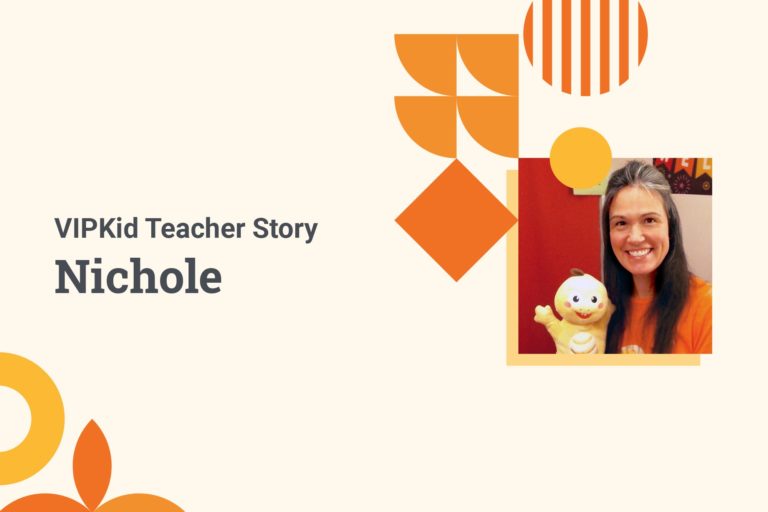
How to Improve Reading Comprehension When Teaching English
VIPKid Teacher Nichole, a reading specialist with more than 20 years of teaching experience discusses her tips Improve Reading Comprehension.
May 4, 2021
By continuing to use this site, you accept our use of cookies . You can change your cookie settings at any time.
- Order Proofreading Order Resume Writing Additional services for: Academics Authors Businesses

- Get Proofreading
- All Services
- Free Samples
From the team that provides tutoring , proofreading , and resume writing to ESL learners.

22 Engaging ESL Essay Topics You Can Use to Improve Your Writing Skills
Text Version:
The only way to get better at anything is to do it—over and over again. In addition to practicing your English conversational skills, you should also practice your writing skills on a regular basis.

Here are twenty-two potential essay topics to get you started, but don’t be afraid to branch out and come up with your own topics, as well.
Descriptive topics
- Describe your favorite place in as much detail as possible.
- What do you do outside of school and work? Describe any hobbies you have, sports you participate in, or other activities you regularly enjoy.
- If you could invite five people to a dinner party, who would they be? What is each guest like?
- Describe your favorite fictional character in as much detail as possible.
- If you could only eat one food for the rest of your life, what would it be? Describe it and explain why you’d choose it.
Instructions
- Give directions for getting from one point to another. Explain what landmarks someone might see along the way.
- Explain how to entertain guests who unexpectedly arrive at your home.
Verb tense practice
- What’s one thing you could never live without and why?
- Describe your ideal town or city, why you would want to live there, and what you would do there.
- Write about a time in the past when you had to make a difficult decision, and explain what you did.
- Talk about five specific goals you want to accomplish this year, and explain how you are going to accomplish them.
- Imagine you’re babysitting a child who breaks the kitchen table. Explain to the child how they could have avoided doing this if they had behaved differently.
Practical vocabulary practice
- Write a review of a new restaurant (either fictional or real) in your area.
- Describe the best party or large-scale event you’ve ever attended.
- If you could get one gift for everyone in your family, regardless of the cost, what would you get them and why?
- Choose a form of transportation (such as cars, trains, boats, planes, or subways) and explain how it has changed people’s lives.
- Write a pitch for a new blockbuster movie. Explain what will happen in the movie and why it will draw crowds to the theater.
Persuasive writing practice
- Do you think our society is too dependent on technology like smartphones? Why or why not?
- Imagine that a big new department store is being built in your hometown. Do you support this development or not?
- Do you think it’s better for students to have a long summer break or be in a year-round school system with more breaks throughout the year? Explain your position.
- Should employers set aside time during the day for their employees to exercise? What might be some of the advantages or disadvantages of this?
- What is your favorite book or movie, and why should people read or watch it?
What are some great ESL essay topics you've encountered? Let us know in the comments.

- ← Next Post Previous Post →
Comments on this post (6 comments)
Eliakim balle says....
Here’s a topic:
write about what your ideal weekend would look like if you could do anything you want.
On April 01, 2019
Ndate Thabo says...
¨Write about when u took the risk to do the right thing.¨ Good prompt . . and something to live by.
El sari says...
Interesting question Jessica …according to me to find someone to teach you and guide you better than trying thanks by your own ..
On March 11, 2016
Jessica Bordelon says...
What is the best way to learn: by experiencing something on your own, or from someone explaining it to you? What brings the most happiness: buying things or having experiences?
On March 03, 2016
Bindi kanyal says...
Niceee…..
On December 08, 2015
dayo says...
Write about when u took the risk to do the right thing
On December 05, 2014
Leave a comment

Made in the USA (we edit US , UK , Australian , and Canadian English). © 2024 ProofreadingServices.com, LLC | Terms | Privacy | Accessibility
- Subscribe for Discounts and Tips
Please choose your service:
Proofreading and editing.
GET A QUOTE
Translation
Publishing and marketing for authors, resumes, cvs, and cover letters, ghostwriting books, please select from the options below:, memoir ghostwriting, ghostwriting for ceos.
back to the other services
ESL Activities
ESL Games, Activities, Lesson Plans, Jobs & More
The Best ESL Writing Prompts and Topics for Beginners
Learning a different language is hard. Writing in a different language is even harder. But the only way to improve writing is to write more! One way to make writing less frustrating for your ESL students is to provide them with interesting writing prompts and topics.
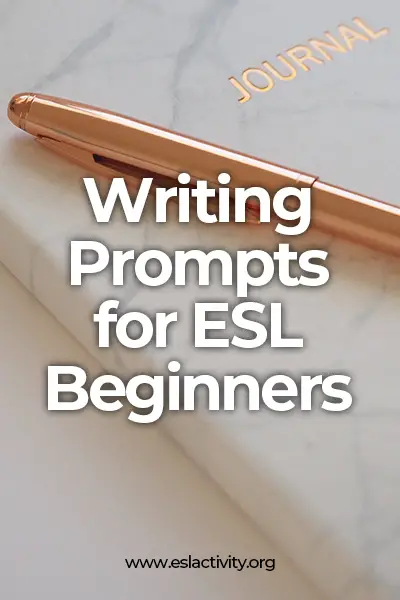
Writing Prompts for ESL Beginners
Purpose of Writing Prompts
The main purpose of writing prompts is to encourage students’ interests and also encourage them to write about the topic. This doesn’t mean that you always want to limit what your students write. It is also encouraged for students to come up with a topic of their own. However, thinking of a topic every single time can also be stressful. So, for ESL beginners, writing prompts act more like a guide to starting the writing.
If you are teaching ESL beginners how to write, try to keep the writing assignment short to about like 100 words. Once they get used to describing the topic and writing in a creative way, you can increase the word limit. Go through the list of writing prompts and find the topics that will interest your ESL students.
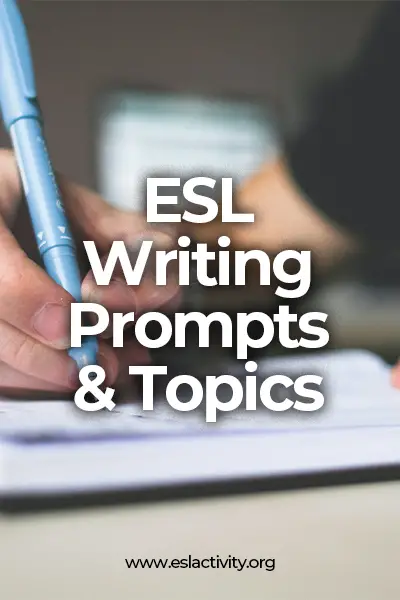
ESL Writing Prompts and Topics
30 Writing Prompts for ESL Beginners
- Describe your favourite holiday.
- Describe your best friend.
- Talk about your best vacation memory.
- Write about your New Year’s resolutions.
- What would you do if you won the lottery?
- Write about your family members.
- Describe your favourite game.
- Write about your favourite movie.
- Who is your favourite celebrity, and why?
- What do you like to do during summer vacation?
- What is our earliest memory as a child?
- What are your strengths?
- What are your weaknesses?
- What is your favourite season, and why?
- Describe your happiest memory.
- What kind of superpower do you want, and why?
- Describe your favourite movie (or TV series, book) character.
- What are the three most recent things that you bought? Where did you buy it from?
- Describe a perfect day for you.
- Which country do you want to visit, and why?
- Describe what makes a good friend.
- What do you like to do in your free time?
- Do you prefer presents or money? Why?
- Would you rather live in a very cold country or a very hot country? Why?
- Describe your favourite restaurant.
- Describe your favourite drink besides water.
- Which superhero do you want to be friends with? Why?
- Do you prefer a rainy day or a snowy day? Why?
- Talk about your favourite animal.
- Would you rather go back in time or travel in the future? Why?
Even More Writing Prompts for Beginners
When it comes to selecting writing topics for beginners, it’s important to choose subjects that are simple, relatable, and promote vocabulary and sentence structure development. Here are some ideas:
- My Family : Ask students to write about their family members, their names, ages, and occupations. They can describe their relationships and write a few sentences about each family member.
- My Hobbies : Have students write about their favorite hobbies or activities. They can describe why they enjoy them and how often they engage in these activities.
- My Daily Routine : Ask students to write about their daily routine, starting from when they wake up until they go to bed. They can describe their activities, such as getting ready, going to school or work, eating meals, and doing homework.
- My Favorite Food : Encourage students to write about their favorite food or dish. They can describe its taste, ingredients, and how it is prepared. Encourage them to use descriptive words to make their writing more interesting.
- My Favorite Season : Have students write about their preferred season of the year. They can describe the weather, activities, and events they associate with that season.
- A Memorable Holiday : Ask students to write about a holiday or vacation they remember. They can describe where they went, what they did, and why it was memorable.
- My Best Friend : Encourage students to write about their best friend. They can describe their friend’s appearance, personality, and what they like to do together.
- My Dream Job : Have students write about their dream job. They can explain what it is, why they are interested in it, and what skills or qualifications are necessary for that job.
- My Favorite Book/Movie : Ask students to write about their favorite book or movie. They can describe the plot, characters, and why they enjoy it.
- My Future Goals : Encourage students to write about their aspirations and goals for the future. They can write about what they want to be when they grow up or their plans for further education.
Tips for Teaching ESL Writing to Beginners
Before teaching your students an ESL writing lesson, check out these tips first.
Error Correction
Yes, you want to help students improve their writing. However, pointing out every single error in the writing can discourage students. Remember that your students are writing in a foreign language. Of course, they will make many mistakes as beginners.
However, it is still important to let them know where have made mistakes. The tip here is to praise a lot and let them know what’s good about their writing and then highlight the grammatical errors. This way, you will be able to make corrections without demotivating them.
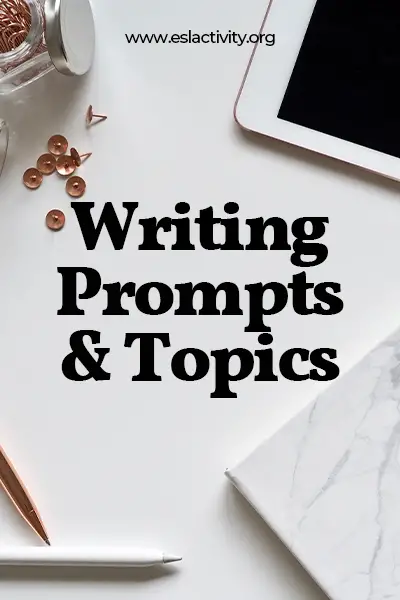
writing prompts and topics
Student’s Interests
You want to encourage students and have them be interested in writing about the topic. To do so, you will have to choose topics related to what students are already interested in. You don’t necessarily have to use the exact writing prompts provided above. If you know what your students like, switch it up a bit to fit their interests. If there’s something your ESL students want to write about, let them do that too!
Provide Writing Structure
Teach your students how to structure the writing. Students will refer to that structure every time they are given a writing assignment. A structure to follow will lessen the stress of writing. Knowing how to begin an introduction, write the main point, and finish with a conclusion will help students worry less about how to structure and focus on being creative with their writing.
FAQs About English Writing Prompts for Beginners
Here are some of the most frequently asked questions about writing prompts for ESL beginners.
What are some easy writing prompts?
List of easy writing prompts:
- What are your strengthes and weaknesses?
What are some fun writing prompts?
List of fun writing prompts:
- Would you rather become 10 years younger or 10 years older? Why?
- Which one is better and why? Being too short or too small.
- If you could be someone else for a day, who would you be?
Writing Prompts for ESL Beginners: Join the Conversation
What are your thoughts on these writing prompts for ESL beginners? Which one is your favourite? If there are other great writing prompts for English beginners, let us know in the comments! We’d love to hear from you.
About Jackie
Jackie Bolen has been teaching English for more than 15 years to students in South Korea and Canada. She's taught all ages, levels and kinds of TEFL classes. She holds an MA degree, along with the Celta and Delta English teaching certifications.
Jackie is the author of more than 60 books for English teachers and English learners, including Business English Vocabulary Builder and 39 No-Prep/Low-Prep ESL Speaking Activities for Teenagers and Adults . She loves to share her ESL games, activities, teaching tips, and more with other teachers throughout the world.
You can find her on social media at: YouTube Facebook Pinterest TikTok LinkedIn Instagram
Top Selling ESL Activity Book

As an Amazon Associate, I earn from qualifying purchases.
More ESL Activities and Games

Top 15 Tongue Twister for Kids (Easy/Hard/Funny)

ESL Food Games and Activities | Fun Food and Drink Games for ESL

Daily Routines ESL Activities, Games, Lesson Plans & Worksheets

Requesting Games & Asking for Help Activities for ESL
About, contact, privacy policy.
Best-selling author and English teacher Jackie Bolen has been talking ESL activities and games since 2015. The goal is to bring you the best ideas, lesson plans, and activity recommendations for your TEFL classes.
Get in touch: About + Contact
Privacy Policy and Terms of Use
Email: [email protected]
Address: 2436 Kelly Ave, Port Coquitlam, Canada


Topics for Writing
The following Topics for Writing are just a small sample from the game , Roll Play , by Dymon Publications .
Hypothetical
What would you do if you were late for an important appointment?
What would you do if someone accused you of a crime you didn’t commit?
What would you do if you got lost in an unfamiliar city?
What would you do if you left something in a locked building?
What would you do if your best friend stole something from you?
What would you do if you didn’t have enough money to pay your bills?
What would you do if your children were caught shoplifting?
What would you do if your car got a flat tire on the freeway?
If you could change one thing about your past, what would it be?
If you could change one major historical event, what would it be?
Description
- Describe a famous park or recreation area in your home country.
- Describe an interesting neighbor you have had.
- Describe something you could never give away.
- Describe a place you will never forget.
- Describe a sporting event you attended recently.
- Describe a memorable birthday celebration.
- Describe a place you go for recreation or exercise.
- Describe your childhood home.
- Describe someone you respect deeply.
- Describe the nightlife in a city you are familiar with.
- Tell about a recent interview.
- Tell about a time when you lost something.
- Tell about one of your fondest childhood memories.
- Tell about a time when you lied to your parents, boss, or teacher.
- What is your opinion about cellular phones?
- What is your opinion about women in the military?
- What is your opinion about a current politician?
- What is your opinion about violence on television?
- What is your opinion about fortune telling?
- What is your opinion about the tabloids?
- What is your opinion about legalizing marijuana?
- What is your opinion about the welfare system?
- What is your opinion about cloning?
- What is your opinion about recycling?
- Tell about a time when you were treated unfairly.
- Briefly tell about a movie you saw recently.
- Tell about something you made ?from scratch.?
- Tell about a “close call” you had recently.
- Tell about something you wish had never happened.
- Tell about a time when you inadvertently caused trouble for someone else.
Instructions
- Tell how to find something on the Internet.
- Tell how to feed family members who drop by unexpectedly.
- Tell how to dump a boyfriend/girlfriend.
- Tell how to get from your house to the supermarket.
- Tell what to do in an earthquake.
- Tell how to get someone to fall in love with you.
- Tell how to make a paper airplane.
- Tell how to get a good table at a restaurant.
- Tell how to get a discount on an expensive item.
- Tell how to discipline an unruly child.
Sample Personal Essay Topics
Argumentative Essay Topics (from Glendale Community College, Arizona)
Writing Prompts/Journal Topics from Can Teach
TOEFL Writing Topics (from Kazuo.com)
If you have questions or comments about this page, please contact us .


Essay Examples & Writing Tips for ESL/EFL Students (updated 2024)
In this lesson you will find simple essay examples for ESL, EFL and university students. Additional writing tips also show how to write a proper essay with minimal mistakes.
Writing essays is a powerful way to improve your language skills and express your thoughts. In our article, “Essay Examples for ESL/EFL Students,” we embark on a journey through the world of essays, offering you valuable examples and insights to help you gain confidence in your English writing abilities.
Essay Examples and Tips For ESL Students
Sample essay 1. my hobby.
My favorite hobby is playing drums. I spend a lot of my free time playing drums. I started learning to play drums when I was 9 years old. I played in my school’s band. When I was 12, I got a private drum teacher and started to really enjoy playing.
My parents bought me a drum set and I started practicing every day after school. It was very loud, but my mother never complained. I improved a lot, and playing drums has been my favorite hobby ever since.
Now, I play drums in a band with my friend Dan, who plays guitar. We write songs, perform, and practice twice a week. It’s still as fun as it was when I first started playing!
Answer these questions in your essay:
What is your hobby? When did you start doing this hobby? Why do you like doing this hobby? How did you learn this hobby? When do you usually do this hobby? How often do you do this hobby?(every day, one a week, twice a month, on weekends, etc.)
Use this sentence pattern in your essay: start/stop verb+ing I started playing basketball when I was 5 years old. I started reading novels when I was very young
Sentence pattern: verb+ing
When you put a verb after start , begin , stop , finish , or quit , you must add “ ‐ing ”
Examples: I started studying English in 3rd grade. I finished writing my homework at 11:00 last night. My father quit smoking because it is unhealthy. We began dating when we met last year.
Check Also: Essay Writing Tips & How to Avoid Typical Mistakes Short Essay Examples for ESL Students 20 Useful Vocabulary & Phrases to Start Your Essay Argumentative Essay Topics With Points for Students
SAMPLE ESSAY 2. My Favorite Place
Usually when you ask people what their favorite place is, they will talk about a distant place – maybe a beach or a beautiful mountain. But my favorite place is not far away at all. My favorite place is the forest behind my house.
Although the forest behind my house is not very big, when I was little I thought it was huge! There are so many interesting places to play and hide. I can sit on the big rocks and have a picnic, I can climb the tall trees, or I can look for lizards and other little animals.
Even though I have played there many times, I can still spend all afternoon running, playing, and hiking in the forest behind my house.
The forest behind my house is a magical place. If I am in a bad mood, I will go there to be alone and think. When I was little, I liked to imagine that there were magical people who lived in the forest. When I grow up and have children, I hope that they can live near such a special place, too.
Sentence pattern: (not) …at all “at all” means “not even a little”, and you usually put it at the end of a negative sentence (a sentence with “not”).
Example: Brian: Are you hungry: Dave: I just ate dinner. I’m not hungry at all.
Check Also: Essay Writing Tips & How to Avoid Typical Mistakes ✅ Useful Academic Expressions & Phrases For Essay Writing

SAMPLE ESSAY 3. My Best Friend
A best friend is a person you can count on, someone who will always be there to put a smile on your face when you need it. This is why I call Nathan my best friend.
I first met Nathan in second grade. His family just moved here from another town and he didn’t have any friends. We started talking, and one day I went to his house to play video games. Soon, we were hanging out every day, and we stayed at each other’s houses on the weekends.
Nathan and I have a lot in common. We both like jokes, and we both love to play soccer. In summer, we go to the swimming pool and eat ice cream cones. Next year, we are going to learn to play tennis together.
Best of all, I can tell Nathan my secrets, and I know he won’t tell anyone. I call him my best friend because I trust him, because he is a lot of fun, and because we like the same things. I hope our friendship lasts forever!
Sentence pattern: [Subject] lasts [amount of time]
Use this to describe how long something is (how long it “lasts”)
Examples: That is a long movie. It lasts almost 3 hours . Summer vacation lasts about 2 months . The cell phone battery lasts about 1 year . After 1 year, you will need to buy a new one. When my girlfriend broke up with me, she said, “ Nothing lasts forever .”
SAMPLE ESSAY 4. Trip to the Zoo
Going to the zoo is a fun and interesting way to spend a day. The last time I went to the zoo was two months ago, during summer vacation. I went with my mother, father, and sister, and it was a trip that I will never forget.
We saw all kinds of animals at the zoo. We saw monkeys, snakes, and even a lion! In addition, there were birds, lizards, and several different kinds of fish. We got to see an eel, and octopus, and a small shark. My favorite animal was the elephant. It was so huge! We fed the elephants peanuts, and it sprayed us with water!
Although the zoo is very exciting, sometimes it makes me sad to see all the animals in cages. They cannot walk, run, or fly freely. However, it is good that people can go to the zoo and learn about these animals. Therefore, I’m glad we have such a nice zoo in my city
Essay Writing Tips For ESL students:
Writing essays might seem tricky, but with a few simple tips, you can make it easier and better. Especially if English is not your first language, here are some straightforward suggestions:
- Start with a Plan: Before you begin writing, take a moment to think about your main ideas. Make a simple outline with your introduction, main points, and conclusion. It’s like making a roadmap for your essay.
- Use Simple Words: Don’t try to impress with big words. It’s better to use words you know well. Simple words can be just as effective and make your writing clearer.
- One Idea per Paragraph: Each paragraph should talk about one main idea. This makes your essay organized and easy to follow. Start a new paragraph when you move to a new topic.
- Check for Mistakes: After you finish writing, go back and check for mistakes. Look for spelling, grammar, and punctuation errors. It’s a small step, but it makes a big difference.
- Connect Your Ideas: Use words like “but,” “and,” and “so” to connect your ideas. This helps your writing flow smoothly. Remember to put a comma after these words at the beginning of a sentence.
- Read Out Loud: After you’ve written your essay, read it out loud. This helps you catch mistakes and see if your sentences sound right.
- Keep It Simple: Stick to the point. Don’t make your sentences too long or complicated. It’s better to have short, clear sentences.
You May Also Like

20+ most hilarious English fails ever. I’m still laughing hard at #5

The Top Benefits of Pursuing an Education Degree Online

English Story Books for Beginners (Level 2-3-4)
Thanks for the essay examples
Hello Fahim, could we have a friendship with you?
Don't have an Account? Register Now!
Forgot Password
365 essays for english learners.
1 America: Land of Opportunity
2 The Fourth of July
3 The U.S. Federal Government
4 Christmas: A Holiday of Traditions
5 New Year's Day: A Holiday of New Beginnings
6 Martin Luther King Jr Day: To Remember a Civil Rights Leader
7 Valentine's Day: A Holiday of Love and Friendship
8 St. Patrick's Day: A Holiday to Celebrate the Irish
9 Passover: A Jewish Holiday of Remembering
10 Easter: An Important Christian Holiday
11 Mother's Day: A Holiday to Honor Motherhood
12 Father's Day: A Holiday to Honor Fatherhood
13 Memorial Day: A Holiday to Remember Fallen Soldiers
14 Labor Day: A Holiday to Honor Workers
15 Columbus Day: A Holiday to Remember an Explorer
16 Halloween: A Holiday for Costumes and Candy
17 Veterans Day: A Holiday Honoring All Soldiers
18 Chanukah: A Holiday of Lights
19 Thanksgiving: Families Coming Together
20 Lottery: A Chance at Millions
You are using an outdated browser. Please upgrade your browser or activate Google Chrome Frame to improve your experience.
29 ESL Conversation Topics Adult Students Really Enjoy
One key goal almost every adult ESL student shares is gaining the ability to speak English with others.
What better way to learn to speak English than to speak about the very same things that you speak about on a daily basis ?
ESL speaking activities work even better when someone speaks about their own personal recollections, thoughts and ideas on these topics.
Use these topics and questions to get conversations started!
8. Television
11. first dates, 13. motivation, 19. restaurants, 20. cooking, 22. shopping, 26. learning, 28. computers, 29. problems.
Download: This blog post is available as a convenient and portable PDF that you can take anywhere. Click here to get a copy. (Download)
Everybody has hobbies, and everybody loves talking about them. Hobbies could be passions too, you know. Some simple questions to ask include:
- What are your hobbies?
- Why do you like your hobbies so much?
- How often do you do these hobbies?
- How long have you been doing these hobbies, and how did you get started?
- What hobbies did you used to have, but now do not?
- Is it important to have hobbies? Why/why not?
Lots of people work and have lots to say about it. I mean, if you’re spending about a third of your waking hours at work, you may have lots to say.
Some good questions are:
- What work do/did you do?
- Do/did like your job? Why or why not?
- What is your dream job?
- What work is common in your city/area/country?
- What is your general view about work? Why?
Food is possibly the most universal topic of them all and everyone loves to discuss what they eat. Food-themed ESL activities are always a hit with students.
This is also an ideal topic for beginners because the vocabulary is usually pretty simple. You could use questions like:
- What is your favorite food? Why?
- What food do you eat a lot?
- What food comes from your country?
- How do you feel when you eat food?
- What foods do you dislike? Why?
- Where do you usually get food from?
This is a topic that many people get very excited about. If someone is passionate or emotional about a topic, they can be more motivated to speak and understand things related to it.
A few good example questions are:
- Do you like sports? Why/why not?
- How often do you exercise/play sports?
- Did you play any sports as a child?
- What sport/physical activity is popular in your country?
- What is your opinion on professional sports?
As people get older, their perceived value of time increases, so it’s a practical topic that everyone has something to say about.
You could ask questions like:
- How much free time do you usually have?
- How important is time to you?
- If you had more free time, what would you do?
- “Time is money.” Do you agree or disagree? Why?
- How do you feel about time that is wasted?
As people get older, they start to appreciate a good night’s sleep more and more. This topic is often a favorite.
Some example questions are:
- How much sleep do you usually get?
- Why do some people sleep well while other people do not sleep well?
- What do you do when you have trouble sleeping?
- What time do you usually go to sleep? What time do you usually get up?
- Have you ever slept in a strange place that was not a bed?
Everybody loves music and most people feel very strong emotions toward it—especially when it comes to the music that they love (or hate) most. Some simple questions to ask could be:
- What types of music do you like/dislike?
- How do certain kinds of music make you feel?
- What types of music come from your country?
- What’s your favorite song/album/artist?
- What music is popular in your country right now?
Listening to music with English lyrics can be fun and engaging activity that can also start conversations.
Watching music videos with subtitles will help students remember the vocabulary they hear in a song.
Television is one of those topics that everyone has an opinion about.
TV will enable you to showcase native English forms and provide some great context before diving into discussion questions. Good questions include:
- How often do you watch TV?
- Should everyone have a television in their home?
- What is the best way to watch television: On a television set, computer, tablet or phone?
- What television programs are popular in your country?
- What do you think will be the future of television?
- What is your opinion on television?
- If you had your own TV show, what would it be like?

If your students enjoy learning from TV and other native content, you can try a media-focused resource like FluentU .
This website and app teaches English with authentic videos, including clips from TV shows, news segments and commercials.

The video dictionary also links to other videos that use the word for additional context. Students can also take quizzes based on the videos and their flashcard learning.
The pop-culture content on FluentU is more interesting to students than more traditional materials, and it increases the motivation to understand the dialogue.
Authentic media lets students hear English the way native speakers use it and helps them recall the meanings of words better by creating memorable associations with stories and characters.
The FluentU program is available both for schools and for individual learners .
Like television, movies are a popular conversation topic. I mean, who doesn’t watch movies? A few good questions to be asked could be:
- What was the last movie you saw? How was it?
- What is your favorite movie? Why?
- How are the movies in your country? What are the best ones?
- How often do you watch movies in English?
- If there were a movie about your life, what kind of movie would it be? Why?
Travel can be a great discussion topic – it encourages storytelling in the past tense and inspires students to talk about culture and similar topics.
Here are some possible questions:
- Where have you traveled?
- What countries have you been to?
- Where would you like to travel to in the future?
- When you travel, what safety precautions do you take?
- Do you like to prepare a lot before you travel, or just wing it?
- What are some cultural issues that you have experienced while traveling? Do you have any funny or embarrassing stories?
Talking about first dates gets everybody interested. We’ve all been there.
- How many first dates have you had?
- How do you feel about first dates?
- What is a common first date like in your country?
- What is the best/worst first date experience you’ve ever had?
- What makes a good first date in your opinion?
Everyone feels a certain way about risk. Some are risk-oriented, others are risk-averse. Talking about risks seems to generate some good conversation. You could ask questions like:
- What is your definition of risk?
- Are you a risk taker? Why/why not?
- What are the advantages/disadvantages of taking risks?
- What risks do you come across in your work/life?
- What risks have you taken in your life?
Whether or not the students are a motivated bunch, motivation is a good topic to discuss in order to inspire your students.
- How motivated are you in general?
- What motivates you to do things?
- What is the best motivator to succeed?
- What do you do when you feel unmotivated?
- What is a good way to motivate others?
Anyone can appreciate beauty in all its forms, and anyone can recognize the importance of the concept of beauty in our cultures, societies and behaviors.
This makes it a good topic to discuss to get some opinions and various views within a group.
- What is “beauty”?
- What/who do you consider beautiful?
- What does “inner beauty” mean to you?
- Do you consider artificial beauty (cosmetic surgery) to still be beauty? Why/why not?
- How do you feel about the emphasis that people put on beauty these days?
- What would you tell your children about beauty?
Crime may not be on the top of people’s lists of favorite topics but it’s something that’s talked about.
Depending on someone’s life experiences, it may be something that has affected their lives. Learning to discuss it could help in the long run.
Good discussion questions are:
- Is crime a big problem in your city/country?
- Have you ever been a victim of crime?
- What crime is common in your city/country?
- What would you do if you noticed a crime being committed?
- How is the law enforcement in your city/country?
Most people have had some firsthand experience with love that they’d like to talk about. It’s another one of those universal topics that gets the conversation going.
Even if it’s not about romantic love and heartbreak, students can talk about familial love with their parents and children, as well as love between friends.
Questions like these are good:
- What is love?
- Who/what do you love?
- What good/bad experiences have you had with love?
- Can you be too young to be in love? Why/why not?
- How do you feel about love?
We all have goals and talking about them actually gets us more encouraged to do something about them. Sharing goals is also a good way to help get them achieved.
A good set of questions is:
- What are your current goals in life?
- How do you plan to reach your goals?
- How often do you set goals for yourself?
- What goals have you set and achieved in the past?
- How do you feel when you reach your goals?
We all have dreams, sometimes on a nightly basis, and they can make for a great discussion topic as it inspires students to be creative and even whimsical.
Great questions for this topic include:
- What kinds of dreams do you have?
- What do you think dreams mean?
- How much of your dreams do you remember? Why?
- What is your opinion on premonitions? Are they real?
- What are examples of memorable dreams you have had?
Along with eating, people love talking about their favorite eateries and restaurants. Some students might even relate to each other with their choices and views.
Good questions include:
- How often do you go to restaurants?
- What is your favorite restaurant? Why?
- What do you usually order at a restaurant?
- What is the restaurant experience like in your country?
- Have you ever worked in a restaurant?
- If you owned a restaurant, what kinds of food would you serve?
Cooking is another topic that may allow for some good conversation. Most people in most countries do a good amount of cooking.
A few good questions could be:
- In your home, who usually cooks?
- How often do you cook?
- How well do you cook? What can you cook well?
- What are the advantages/disadvantages of cooking?
- What food would you like to learn how to cook?
Recipes can be a fun way to introduce students to assorted cooking vocabulary and phrases. And in addition to written recipes, there are tons of recipe videos on the web if you want to work on listening comprehension as well.
FluentU has lots of videos about food and cuisine, as well as several captioned recipe videos.

If there is one topic that affects everyone, it has to be money. People love talking about money.
Well, they may not if they’re broke—but even then it’s a relatable topic that gets conversations going.
Great questions include:
- How well do you manage your money?
- Why do some people have money problems?
- What are some good ways to make money?
- What would you do if I gave you $20/$2,000/$2,000,000?
- How often do you save money? Why?
This one is a personal favorite for many. Shopping just brings out the zest in some people.
Others feel strongly the other way—very few people are completely neutral on this topic.
A few good questions are:
- Do you enjoy shopping? Why/why not?
- What is your favorite shop? Why?
- In your city, where is a good place to go shopping?
- How do you feel about online shopping?
- What do you think shopping will be like in the future?
Everybody makes plans and discussing them could even influence the class to start making plans of their own! A few example questions include:
- How often do you plan things? Why?
- What are your plans for (________)?
- What are your plans for your English?
- What do you think of this quote? “Having no plan is a plan to fail.”
- Do you have any back-up plans?
Books make for a good conversation topic because most people enjoy a good book.
When you read, your mind is filled with new images, feelings, ideas and thoughts. It can be immensely satisfying for someone to share how they feel about reading.
Some questions to ask are:
- Do you like books/reading? Why/why not?
- What kind of books do/did you like?
- What is your favorite book? Why?
- What was the last book you read?
- Do you believe reading books/literature is more important than reading stuff online? Why/why not?
Life discussions go on in all languages and English is no exception.
Life is a good topic since everyone has their own views and thoughts on this universal subject.
You could bring up questions like:
- What is the meaning of life?
- How is your life going up to this point?
- What do you think happens after death?
- What important life lessons have you learned?
- If tomorrow was your last day to live, what would you do?
Learning is like nature—it’s all around us, even on a subconscious level. Our brains are built to absorb, filter and store information.
A conversation about learning could actually stimulate some English learning!
A few questions that are suitable are:
- How important is learning? Why?
- Besides English, what are you currently learning?
- What things are you good/bad at learning? Why?
- What would you most like to learn?
- What is the most difficult part of learning? Why?
Games are fun and everybody enjoys fun, no?
But in all seriousness, talking about games tends to gear the conversation more toward past tense, which can bring students a fond sense of nostalgia.
Some simple questions could be:
- What is your favorite game ever?
- What games did you play as a kid?
- What games are popular/came from your country?
- How competitive are you when it comes to games?
- What games do you still play now? Why?
It’s hard to go a day without talking about computers. This universal topic could have students discussing quite a few things, much of which could relate to real life too!
Great questions on this could be:
- Describe your computer at home/work.
- What do you usually use a computer for?
- Do you like computers? Why/why not?
- What was the first computer you ever had like?
- What do you think will be the future of computers?
Even though nobody likes to talk about problems per se, everybody still talks about their problems to other people!
Problems are actually a good topic for discussion since they could help others relate to each other and even present solutions too.
A few fine examples of questions are:
- How do you deal with your problems?
- What problems do you come across in your work or life?
- Do you feel that problems are opportunities? Why or why not?
- What was the last problem you solved and how did you do it?
- “Problems don’t matter. Solutions do.” Do you agree or disagree?
Discussion questions like the ones above—questions about everyday things—work well because they really get the brain thinking.
These topics relate directly to students on a familiar level and can even spark some fascinating discussions.
You could even mix up the example questions any way you’d like.
These topics may even inspire you to come up with some of your own, as you begin to understand what works and what doesn’t.
Happy discussing!
For more tips, check out this post next:
Wondering how to teach ESL to adults? While your lessons might be a bit less chaotic than with younger students, they don’t have to be dull or boring. Everyone enjoys…
Enter your e-mail address to get your free PDF!
We hate SPAM and promise to keep your email address safe


Choose Your Test
Sat / act prep online guides and tips, 113 perfect persuasive essay topics for any assignment.
General Education

Do you need to write a persuasive essay but aren’t sure what topic to focus on? Were you thrilled when your teacher said you could write about whatever you wanted but are now overwhelmed by the possibilities? We’re here to help!
Read on for a list of 113 top-notch persuasive essay topics, organized into ten categories. To help get you started, we also discuss what a persuasive essay is, how to choose a great topic, and what tips to keep in mind as you write your persuasive essay.
What Is a Persuasive Essay?
In a persuasive essay, you attempt to convince readers to agree with your point of view on an argument. For example, an essay analyzing changes in Italian art during the Renaissance wouldn’t be a persuasive essay, because there’s no argument, but an essay where you argue that Italian art reached its peak during the Renaissance would be a persuasive essay because you’re trying to get your audience to agree with your viewpoint.
Persuasive and argumentative essays both try to convince readers to agree with the author, but the two essay types have key differences. Argumentative essays show a more balanced view of the issue and discuss both sides. Persuasive essays focus more heavily on the side the author agrees with. They also often include more of the author’s opinion than argumentative essays, which tend to use only facts and data to support their argument.
All persuasive essays have the following:
- Introduction: Introduces the topic, explains why it’s important, and ends with the thesis.
- Thesis: A sentence that sums up what the essay be discussing and what your stance on the issue is.
- Reasons you believe your side of the argument: Why do you support the side you do? Typically each main point will have its own body paragraph.
- Evidence supporting your argument: Facts or examples to back up your main points. Even though your opinion is allowed in persuasive essays more than most other essays, having concrete examples will make a stronger argument than relying on your opinion alone.
- Conclusion: Restatement of thesis, summary of main points, and a recap of why the issue is important.
What Makes a Good Persuasive Essay Topic?
Theoretically, you could write a persuasive essay about any subject under the sun, but that doesn’t necessarily mean you should. Certain topics are easier to write a strong persuasive essay on, and below are tips to follow when deciding what you should write about.
It’s a Topic You Care About
Obviously, it’s possible to write an essay about a topic you find completely boring. You’ve probably done it! However, if possible, it’s always better to choose a topic that you care about and are interested in. When this is the case, you’ll find doing the research more enjoyable, writing the essay easier, and your writing will likely be better because you’ll be more passionate about and informed on the topic.

You Have Enough Evidence to Support Your Argument
Just being passionate about a subject isn’t enough to make it a good persuasive essay topic, though. You need to make sure your argument is complex enough to have at least two potential sides to root for, and you need to be able to back up your side with evidence and examples. Even though persuasive essays allow your opinion to feature more than many other essays, you still need concrete evidence to back up your claims, or you’ll end up with a weak essay.
For example, you may passionately believe that mint chocolate chip ice cream is the best ice cream flavor (I agree!), but could you really write an entire essay on this? What would be your reasons for believing mint chocolate chip is the best (besides the fact that it’s delicious)? How would you support your belief? Have enough studies been done on preferred ice cream flavors to support an entire essay? When choosing a persuasive essay idea, you want to find the right balance between something you care about (so you can write well on it) and something the rest of the world cares about (so you can reference evidence to strengthen your position).
It’s a Manageable Topic
Bigger isn’t always better, especially with essay topics. While it may seem like a great idea to choose a huge, complex topic to write about, you’ll likely struggle to sift through all the information and different sides of the issue and winnow them down to one streamlined essay. For example, choosing to write an essay about how WWII impacted American life more than WWI wouldn’t be a great idea because you’d need to analyze all the impacts of both the wars in numerous areas of American life. It’d be a huge undertaking. A better idea would be to choose one impact on American life the wars had (such as changes in female employment) and focus on that. Doing so will make researching and writing your persuasive essay much more feasible.

List of 113 Good Persuasive Essay Topics
Below are over 100 persuasive essay ideas, organized into ten categories. When you find an idea that piques your interest, you’ll choose one side of it to argue for in your essay. For example, if you choose the topic, “should fracking be legal?” you’d decide whether you believe fracking should be legal or illegal, then you’d write an essay arguing all the reasons why your audience should agree with you.
Arts/Culture
- Should students be required to learn an instrument in school?
- Did the end of Game of Thrones fit with the rest of the series?
- Can music be an effective way to treat mental illness?
- With e-readers so popular, have libraries become obsolete?
- Are the Harry Potter books more popular than they deserve to be?
- Should music with offensive language come with a warning label?
- What’s the best way for museums to get more people to visit?
- Should students be able to substitute an art or music class for a PE class in school?
- Are the Kardashians good or bad role models for young people?
- Should people in higher income brackets pay more taxes?
- Should all high school students be required to take a class on financial literacy?
- Is it possible to achieve the American dream, or is it only a myth?
- Is it better to spend a summer as an unpaid intern at a prestigious company or as a paid worker at a local store/restaurant?
- Should the United States impose more or fewer tariffs?
- Should college graduates have their student loans forgiven?
- Should restaurants eliminate tipping and raise staff wages instead?
- Should students learn cursive writing in school?
- Which is more important: PE class or music class?
- Is it better to have year-round school with shorter breaks throughout the year?
- Should class rank be abolished in schools?
- Should students be taught sex education in school?
- Should students be able to attend public universities for free?
- What’s the most effective way to change the behavior of school bullies?
- Are the SAT and ACT accurate ways to measure intelligence?
- Should students be able to learn sign language instead of a foreign language?
- Do the benefits of Greek life at colleges outweigh the negatives?
- Does doing homework actually help students learn more?
- Why do students in many other countries score higher than American students on math exams?
- Should parents/teachers be able to ban certain books from schools?
- What’s the best way to reduce cheating in school?
- Should colleges take a student’s race into account when making admissions decisions?
- Should there be limits to free speech?
- Should students be required to perform community service to graduate high school?
- Should convicted felons who have completed their sentence be allowed to vote?
- Should gun ownership be more tightly regulated?
- Should recycling be made mandatory?
- Should employers be required to offer paid leave to new parents?
- Are there any circumstances where torture should be allowed?
- Should children under the age of 18 be able to get plastic surgery for cosmetic reasons?
- Should white supremacy groups be allowed to hold rallies in public places?
- Does making abortion illegal make women more or less safe?
- Does foreign aid actually help developing countries?
- Are there times a person’s freedom of speech should be curtailed?
- Should people over a certain age not be allowed to adopt children?
Government/Politics
- Should the minimum voting age be raised/lowered/kept the same?
- Should Puerto Rico be granted statehood?
- Should the United States build a border wall with Mexico?
- Who should be the next person printed on American banknotes?
- Should the United States’ military budget be reduced?
- Did China’s one child policy have overall positive or negative impacts on the country?
- Should DREAMers be granted US citizenship?
- Is national security more important than individual privacy?
- What responsibility does the government have to help homeless people?
- Should the electoral college be abolished?
- Should the US increase or decrease the number of refugees it allows in each year?
- Should privately-run prisons be abolished?
- Who was the most/least effective US president?
- Will Brexit end up helping or harming the UK?

- What’s the best way to reduce the spread of Ebola?
- Is the Keto diet a safe and effective way to lose weight?
- Should the FDA regulate vitamins and supplements more strictly?
- Should public schools require all students who attend to be vaccinated?
- Is eating genetically modified food safe?
- What’s the best way to make health insurance more affordable?
- What’s the best way to lower the teen pregnancy rate?
- Should recreational marijuana be legalized nationwide?
- Should birth control pills be available without a prescription?
- Should pregnant women be forbidden from buying cigarettes and alcohol?
- Why has anxiety increased in adolescents?
- Are low-carb or low-fat diets more effective for weight loss?
- What caused the destruction of the USS Maine?
- Was King Arthur a mythical legend or actual Dark Ages king?
- Was the US justified in dropping atomic bombs during WWII?
- What was the primary cause of the Rwandan genocide?
- What happened to the settlers of the Roanoke colony?
- Was disagreement over slavery the primary cause of the US Civil War?
- What has caused the numerous disappearances in the Bermuda triangle?
- Should nuclear power be banned?
- Is scientific testing on animals necessary?
- Do zoos help or harm animals?
- Should scientists be allowed to clone humans?
- Should animals in circuses be banned?
- Should fracking be legal?
- Should people be allowed to keep exotic animals as pets?
- What’s the best way to reduce illegal poaching in Africa?
- What is the best way to reduce the impact of global warming?
- Should euthanasia be legalized?
- Is there legitimate evidence of extraterrestrial life?
- Should people be banned from owning aggressive dog breeds?
- Should the United States devote more money towards space exploration?
- Should the government subsidize renewable forms of energy?
- Is solar energy worth the cost?
- Should stem cells be used in medicine?
- Is it right for the US to leave the Paris Climate Agreement?
- Should athletes who fail a drug test receive a lifetime ban from the sport?
- Should college athletes receive a salary?
- Should the NFL do more to prevent concussions in players?
- Do PE classes help students stay in shape?
- Should horse racing be banned?
- Should cheerleading be considered a sport?
- Should children younger than 18 be allowed to play tackle football?
- Are the costs of hosting an Olympic Games worth it?
- Can online schools be as effective as traditional schools?
- Do violent video games encourage players to be violent in real life?
- Should facial recognition technology be banned?
- Does excessive social media use lead to depression/anxiety?
- Has the rise of translation technology made knowing multiple languages obsolete?
- Was Steve Jobs a visionary or just a great marketer?
- Should social media be banned for children younger than a certain age?
- Which 21st-century invention has had the largest impact on society?
- Are ride-sharing companies like Uber and Lyft good or bad for society?
- Should Facebook have done more to protect the privacy of its users?
- Will technology end up increasing or decreasing inequality worldwide?

Tips for Writing a Strong Persuasive Essay
After you’ve chosen the perfect topic for your persuasive essay, your work isn’t over. Follow the three tips below to create a top-notch essay.
Do Your Research
Your argument will fall apart if you don’t fully understand the issue you’re discussing or you overlook an important piece of it. Readers won’t be convinced by someone who doesn’t know the subject, and you likely won’t persuade any of them to begin supporting your viewpoint. Before you begin writing a single word of your essay, research your topic thoroughly. Study different sources, learn about the different sides of the argument, ask anyone who’s an expert on the topic what their opinion is, etc. You might be tempted to start writing right away, but by doing your research, you’ll make the writing process much easier when the time comes.
Make Your Thesis Perfect
Your thesis is the most important sentence in your persuasive essay. Just by reading that single sentence, your audience should know exactly what topic you’ll be discussing and where you stand on the issue. You want your thesis to be crystal clear and to accurately set up the rest of your essay. Asking classmates or your teacher to look it over before you begin writing the rest of your essay can be a big help if you’re not entirely confident in your thesis.
Consider the Other Side
You’ll spend most of your essay focusing on your side of the argument since that’s what you want readers to come away believing. However, don’t think that means you can ignore other sides of the issue. In your essay, be sure to discuss the other side’s argument, as well as why you believe this view is weak or untrue. Researching all the different viewpoints and including them in your essay will increase the quality of your writing by making your essay more complete and nuanced.
Summary: Persuasive Essay Ideas
Good persuasive essay topics can be difficult to come up with, but in this guide we’ve created a list of 113 excellent essay topics for you to browse. The best persuasive essay ideas will be those that you are interested in, have enough evidence to support your argument, and aren’t too complicated to be summarized in an essay.
After you’ve chosen your essay topic, keep these three tips in mind when you begin writing:
- Do your research
- Make your thesis perfect
- Consider the other side
What's Next?
Need ideas for a research paper topic as well? Our guide to research paper topics has over 100 topics in ten categories so you can be sure to find the perfect topic for you.
Thinking about taking an AP English class? Read our guide on AP English classes to learn whether you should take AP English Language or AP English Literature (or both!)
Deciding between the SAT or ACT? Find out for sure which you will do the best on . Also read a detailed comparison between the two tests .

Christine graduated from Michigan State University with degrees in Environmental Biology and Geography and received her Master's from Duke University. In high school she scored in the 99th percentile on the SAT and was named a National Merit Finalist. She has taught English and biology in several countries.
Ask a Question Below
Have any questions about this article or other topics? Ask below and we'll reply!
Improve With Our Famous Guides
- For All Students
The 5 Strategies You Must Be Using to Improve 160+ SAT Points
How to Get a Perfect 1600, by a Perfect Scorer
Series: How to Get 800 on Each SAT Section:
Score 800 on SAT Math
Score 800 on SAT Reading
Score 800 on SAT Writing
Series: How to Get to 600 on Each SAT Section:
Score 600 on SAT Math
Score 600 on SAT Reading
Score 600 on SAT Writing
Free Complete Official SAT Practice Tests
What SAT Target Score Should You Be Aiming For?
15 Strategies to Improve Your SAT Essay
The 5 Strategies You Must Be Using to Improve 4+ ACT Points
How to Get a Perfect 36 ACT, by a Perfect Scorer
Series: How to Get 36 on Each ACT Section:
36 on ACT English
36 on ACT Math
36 on ACT Reading
36 on ACT Science
Series: How to Get to 24 on Each ACT Section:
24 on ACT English
24 on ACT Math
24 on ACT Reading
24 on ACT Science
What ACT target score should you be aiming for?
ACT Vocabulary You Must Know
ACT Writing: 15 Tips to Raise Your Essay Score
How to Get Into Harvard and the Ivy League
How to Get a Perfect 4.0 GPA
How to Write an Amazing College Essay
What Exactly Are Colleges Looking For?
Is the ACT easier than the SAT? A Comprehensive Guide
Should you retake your SAT or ACT?
When should you take the SAT or ACT?
Stay Informed
Get the latest articles and test prep tips!
Looking for Graduate School Test Prep?
Check out our top-rated graduate blogs here:
GRE Online Prep Blog
GMAT Online Prep Blog
TOEFL Online Prep Blog
Holly R. "I am absolutely overjoyed and cannot thank you enough for helping me!”
Would you like to help?

101 ESL Conversation Topics to Break the Silence

ESL Conversation Starters
Looking for that missing element that will help your ESL conversation classes sparkle, shine and speak English?
Leading an engaging ESL conversation class isn’t something you can just pull off at the drop of a hat. But these tricks can help you go from zero to ESL hero. As a matter of fact, the one big secret is having…
Ready? Drumroll, please.
101 ESL conversation topics from a hat.
101 ESL Conversation Topics From a Hat
How many times have you been in an ESL conversation class and just couldn’t get your students to speak?
In the classroom and in everyday life, we need conversation starters or ice breakers to end the silence. Arguably, there’s nothing stranger than silence in a conversation class!
Here’s how you do it:
Before you start the school year, dedicate some time to preparing a list of free talking topics (see below).
First, print the conversation topics below. Second, cut each topic and put them in a hat. Finally, have them attached to your hip whenever you’re in need.
You can either open the whole classroom for discussion or have them speak in pairs. Furthermore, these ESL conversation topics are great for filling in any extra time at the end of the class or ice breakers at the start of a lesson.
And if you’d like more free ESL activities for your classroom, don’t forget to check out our other lists to engage your students in English. All are free and can be used for any purpose.
- 43 Free ESL Worksheets that Enable English Language Learners
- 13 Free ESL Lesson Plans to Master Your ESL Classes
- 67 Free ESL Games to Teach English Like an All-Star
Either way, the goal is to get them practicing in English.
Culture Differences for Kids
- High schools (Do students wear special school attire like uniforms? Can students drive to their high school? Can students drink water in class?)
- Country work ethic (How long are typical work hours? Do students work after graduating?)
- School clubs (What unique school clubs are there? Which club are you in? Why did you choose that club?)
- Holidays (What is your favorite holiday? What type of food do you eat on specific holidays?)
- Jobs (What jobs exist? Is it easy to get a job after graduation? Is it easy to find a job now?)
- Pop culture (Who are pop culture icons in your home country?)
- Video games (Do you play video games? What types of video games are popular?)
- Parenting and punishment (What kind of punishment have you received at school or home? Do you believe in physical punishment?)
Culture Differences for Adults
- Restaurant tips (Are tips at restaurants common? How much is a reasonable tip?)
- Work dinner parties (Do wives and husbands attend work parties?)
- Gestures (What are some unique gestures (thumbs up, middle finger, etc) in your country?)
- Gift exchange (When you travel, is it common to exchange gifts? How about Christmas or any other holidays?)
- Living with parents (How old do kids live with their parents?)
- Greetings (How do you greet in your country? Do you bow or do handshakes?)
- Safety and crime (Do you think your neighborhood is safe? What kind of crimes happen in your area?)
- Punctuality (How often are friends late? How about buses and trains? Is it rude being late?)
- Food and health (What is a typical meal? How healthy is it? Are gyms becoming more popular?)
- Sports (How do sports players show respect after a game? Are there any unique sports in your country?)
- Multiculturalism (Is your country multicultural? Is multiculturalism a good thing?)
- Gender discrimination (Do women and men make the same amount of money for doing the same job? Is there much gender discrimination in your home country?)
If you…
- If you had one wish, what would it be?
- If you were rich, what would you do?
- If you could be a celebrity for a day, which celebrity would you be?
- If you were the principal at school, what would you change?
- If you could go anywhere in the world, where would you go and why?
- If you were on a deserted island, what would you bring and why?
- If you could be any animal for a day, what would it be and why?
- If you could have any superpower, what would you pick and why?
- If you could pack only 3 items for your next trip, what would they be?
- If you could change one thing about yourself, what would it be?
- If you could travel to the moon, would you like to go?
- If you win the lottery, what is the first thing you would do?
- If you owned an island to yourself, what rules would you implement?
- If they could pick a Halloween costume to dress up as on Halloween, what would it be?
- If you could be born at a different time period, when would it be?
- If you could change the past, would you do it?
- If you could make a movie, which celebrity would you pick as yourself?
- If you found a large amount of money, what would you do?
- If you could change anything about your country, what would you change?
- If you could be born in another country, which one would you pick?
- If you could do your dream job 10 years from now, which job would you choose?
Have you ever…
- Have you ever traveled out of your home country?
- Have you ever cried when watching a movie? If yes, which one?
- Have you ever experienced culture shock?
- Have you ever wanted to get a tattoo or piercing?
- Have you ever laughed so much that it made you cry?
- Have you ever been lost and couldn’t find directions?
- Have you ever fallen in love? If no, do you want to find love?
- Have you ever won a trophy? If yes, which competition did you win?
- Have you ever read a book that changed your life?
- Have you ever been to Disneyland or an amazing theme park?
- Have you ever had a dream that felt like it was real?
- Have you ever seen something supernatural or paranormal?
- Have you ever ridden a horse?
- Have you ever had imaginary friends when you were young?
- Have you ever had to go to the hospital?
- Have you ever been outside your home country?
- Have you ever experienced a natural disaster?
- Have you ever owned a pet?
- Have you ever donated anything to the poor?
- Have you ever seen a car accident?
Would you rather…
- Would rather be very intelligent or very good-looking?
- Would you rather have a pet dog or cat?
- Would you rather grow up going to school in your home country or another one?
- Would you rather be a professional athlete or a celebrity actor?
- Would you rather live forever or until 100 years old?
- Would you rather live in the mountains or on the beach?
- Would you rather bungee jump or skydive?
- Would you rather be rich or find true love?
- Would you rather walk backward or talk backward for the rest of your life?
- Would you rather explore the oceans or outer space?
- Would you rather live in an apartment or a house?
- Would you rather be invisible or super fast?
- Would you rather live in a country that is always cold or hot?
- Would you rather live in the city or a small town?
- Would you rather be a jack-of-all-trades or master one?
- Would you rather ride an elephant or swim with dolphins?
- Would you rather be rich and depressed or broke and happy?
- In the past or future, when would you rather travel?
- Would you rather eat rice or bread with every meal?
- Would you rather use the internet or books as your main source of information?
Controversial
- How do you deal with stress?
- What is the best advice you have ever received?
- Do you think aliens exist?
- Is climate change real?
- What age is best to start dating?
- What personality traits do you want in your boyfriend or girlfriend?
- Have you ever had a problem with bullying?
- Are girls smarter than boys?
- In the future, how many children do you want to have?
- What makes a good teacher?
- Who was your hero when you were a child?
- What is the worst purchase you have made?
- Would you rather know how you die or when you die?
- What was the best holiday you’ve been on?
- Is there any strange food in your country?
- What are some inventions you hope to see in the future?
- What is the most embarrassing moment of your life?
- Would you ever try online dating?
- What is on your bucket list?
- Do you believe in any religions?
- When was the last time you cried?
With 5 Minutes Left, What Do You Do?
All things considered, 101 ESL conversation topics from a hat is a fantastic end of the class time filler.
When you run out of things to do, pull out the hat and pick a topic. Otherwise, your class would just be sitting there twiddling their thumbs.
Strangely enough, a lot of teachers don’t equip themselves with back-up activities.
Now, you don’t have to sweat it out and watch the clock tick until the bell rings.
30 Comments
That sounds interesting
Amazing and inspiring on how to have extra activities for backup.
Thank you so much for sharing the topics.
I am a senior citizen trying to revive my teaching skills. You did it for me.
I’m glad I found this. Thank you so much!
Very useful.
There are many valuable questions here, and some which are inappropriate for some students. I think it is part of the teachers job to know their students and choose topics appropriate to their age, gender, culture etc. On the whole there are many inspirational topics to choose from here as a springboard to develop your own, perhaps more relevant, questions while still appreciating the efforts and work of the original source.
On the whole, very useful. I have taught in Asia for 20+ years. On the whole, STFU about love and dating. You come across as a lech. Plus countries like China and Japan do not need any more Western cultural poison.
thank you… thank you… so much… it’s really very helpful…
Very hepful! Thank you!
Sorry but “Is climate change real” is NOT a topic for conversation! It’s like saying ‘Is COVID real’ !!!! I’d suggest instead, ‘How do we deal with climate change’
Very helpful thanks for taking the time.
Great material! Thanks a million!
Thanks for the ideas of the topics and questions. All of them can help me a lot in my conversation class.
Thank you very much, this is very useful for my classes 🙂
Great questions.
As for potentially inappropriate questions, I would hope that every teacher has enough sense to decide what is appropriate or not for their students depending on age, maturity level, cultural norms/taboos, class dynamic, etc.
I’ve had classes where I would never think of asking some of these questions, and I’ve had classes where we’ve probably discussed all of these topics along with issues that are way more controversial. And those were some of my best classes.
Consider your class and use your best judgement.
Thanks for sharing!
Thanks for your work, splendid to liven up conversation in class. Thanks for the kindness of your generosity to share this. I believe it is crucial to be thankful and to contribute, and not just criticize. Thanks again
While there are some useful questions here, I’d be wary about asking questions regarding love and dating, as well as outdated gender ideology that reflects one’s own personal biases. For example, the gender wage gap has been debunked by all credible economists. 5 minutes googling will reveal to you why some men and women earn more than other men and women, and it’s nothing to do with gender. So with that and similar questions you’re bound to come into conflict with students with traditional conservative feminist views on wage differences, or ruin the group dynamic of a class of mixed gender students.
Wow……Mind blowing questions…..My ESL classes are gonna be fun-filled hereafter
These are wonderful and diverse topics to break the ice in a ESL class. Thank you for great selection of topics.
This is so amazing thank you so much!
These questions were so helpful, I would love to read more topics if any. Thank you
I loved it! thank you so much, I’ve been learning English for 9 months and my skill at talking has been improving every day more thanks to these topics
I find most of these questions helpful and interesting, so I thank you for that, but there are questions that I think are inappropriate to ask your students, particularly the questions about love, dating, and crying. I also found multiple grammar errors in this article. For example:
“Have you ever had imaginary friends when you were young?” “In the past or future, when would you rather travel to the ?”
Depending on your class, age and level of maturity, I agree the questions about love and dating could be inappropriate. But of course, every situation is different.
I was talking with a 12 year old in KSA whose younger 8 year old brother had gone to a farm earlier in the day. It turns out he goes to this farm every day.
Kids Love animals.
ask if You had a farm,
what kind of animals would You have? describe the animals. describe their behavior. what color is each animal? size? what would You feed each animal?
This is a good place to start. just my idea.
Nice organized and interesting ideas. Thank you
I found these tips very useful and interesting. I will be using some of your suggestions. Thanks.
They are very useful questions. Thank you and I hope there are more
Leave a Reply Cancel reply
Your email address will not be published. Required fields are marked *
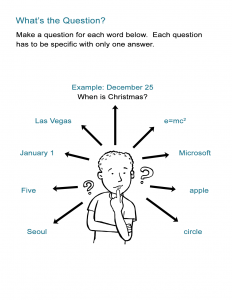
Asking Questions

Free Talking Topics
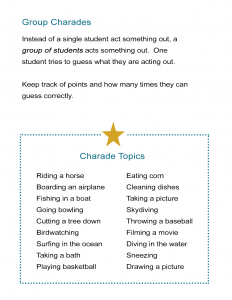
Group Charades

Have You Ever?

No Subtitles
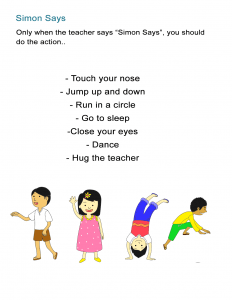
Talking Time Bomb

The Classroom Movie

What’s in the Box ?
150 ESL Conversation Starters and Questions (The Essential List)
Do you want your students to be excited to speak with you in English?
Do you want to make sure you always know where the conversation is going and what to say next?
You need engaging content, interesting conversation starters, and questions that really reel them in.
Join our mailing list to receive a free ESL teaching resource every week.
Click to Join
This list of 150 ESL conversation starters will give you everything you need to make sure you always have something interesting to talk about and never run out of things to say!

Why Every Teacher Needs a List of Starters
Conversation topics for adults and teens, conversation topics for kids, conversation topics for beginners, weird and funny conversation starters, controversial conversations topics, additional tips for your conversation lessons, final thoughts.
If you want to improve your student’s speaking ability you need to master the art of conversation. You need to know how to get your students speaking , move the conversation forward, provide feedback and make it all feel natural. You also need engaging topics and that is where this guide comes in.
One of the problems that can face a teacher is knowing what to talk about. What do you do when you’ve finished talking about work, the weather and then realise that only 5 minutes have passed!
This guide has everything you need to make sure you never run out of topics and most importantly you always have something interesting to say.
It is a good idea to pick a particular topic for a class (or even have your student pick if you want more engagement from them). Once you have that topic then move through the questions, trying to get as much from each one as possible.
Browse our ESL teacher resources section for more tips and printable lesson materials.
Adults and teens usually know more about advanced topics than children (politics, religion, etc.) That being said, knowing more on these topics doesn’t necessarily translate to being able to speak about these things easily so don’t assume they can do everything. Be aware of your student’s level and be prepared to reframe a question if they are struggling to understand.
- Where do you work?
- Do you enjoy your job?
- Do you use English for your job?
- Tell me about your last job.
- What do you think is the most difficult job in the world?
- What do you think is the easiest job in the world?
- Where would you work if you could pick any job?
- Would you still work if you won the lottery?
- Do you think robots will replace all of the jobs in the future?
- Which kind of job should have the highest salary?
In this post, you’ll get 20 topics and activities for Business English lessons.
- Do you listen to music?
- When did you start listening to music?
- Do you play a musical instrument?
- What do you think the future of music will be like?
- If you could meet any musician, who would it be?
- Why do people like music?
- If you could erase a musical genre, which would it be?
- Do you think musical success comes from working hard or luck?
- What was the first album you bought?
- Have you ever downloaded music illegally?
- What is a holiday?
- Do you often go on holiday?
- Where did you last go on holiday?
- Where would you like to go on holiday next?
- Do you prefer relaxing or having an adventure on your holiday?
- Is it weird to go on holiday by yourself?
- What is the best food you’ve eaten while on holiday?
- Can you imagine what holidays 500 years ago were like?
- Would you like to go on holiday to space?
- What do you think the future of the holidays will be like?
- What is technology?
- What do you think of when you hear the word ‘technology’?
- How has technology changed in the past?
- How has technology changed your life?
- Could you live without technology?
- Find the full list of technology questions here
In order to engage a child in conversation, you have to enter their world. What is fun for them? What do they like to do? Using words/phrases like “wow”, “That sounds tasty”, “Awesome” can show you are listening to them and make things more fun which will get them saying more!
- Do you have a pet?
- What do you think pets do in the day?
- What do pets eat?
- Are cats better or dogs?
- What is the best name for a pet?
- Would you like a pet spider?
- Would you like to be an animal? Which one?
- Why do we have pets?
- Do you prefer cute or fun pets?
- What is the best present for a pet?
- Do you like school?
- What is your favourite subject?
- What is your least favourite subject?
- Who is your favourite teacher?
- Why do people have to go to school?
- Do you like homework?
- What would you do if you were the headteacher?
- How could schools be more fun?
- How long are the summer holidays?
- Can you learn and have fun at the same time?
- What is your favourite movie?
- Who is your favourite character?
- Who is your least favourite character?
- Do you like disney movies?
- What was the last movie you saw at the cinema?
- How often do you watch movies?
- Do you wish you could live in a movie?
- Why do you watch movies?
- Do you prefer reading books or movies?
- Do you watch any movies in English?
Keeping the topics simple for beginners is a must at the start. Talking about their hobbies and family can help as these are areas they may have already experience in talking about. If a student is really struggling then giving them phrases to use such as “I like …” can help get the ball rolling.
- What do you like to do?
- Do you do any sports?
- What types of movie do you like?
- Do you play video games?
- What do you usually do with friends?
- Is learning English a hobby or work?
- Do you have any unusual hobbies?
- Do you have enough time for your hobbies?
- What is a common hobby?
- What do you think is a boring hobby?
- Do you live with your family?
- How many people are in your family?
- Are you close with your family?
- How often do you see your family?
- What do you do with your family when you see them?
- Is your family important to you?
- Which is more important, friends or family?
- Who is the weirdest person in your family?
- Are families less important nowadays than in the past?
- What would happen if we didn’t have families?
- Where do you live?
- What is there to do in your city?
- What is your place like?
- What is your neighbourhood like?
- Are there any parks near where you live?
- Have you ever lived elsewhere?
- How many rooms does your place have?
- If you moved, where would you like to live?
- Would you prefer to live in the city or country?
- Would you like to live abroad?
Use information gap activities to help your students practice speaking: read our guide.
Nobody wants to speak about the same mundane topics, especially if they’re an advanced student. Being able to mix it up is a great attribute to have as a teacher. Not only will you have memorable lessons with these conversation starters but it will really test the ability of the students to think about topics they aren’t used to (instead of rolling off easy answers about familiar topics.)
Zombie Apocalypse Plan
- What is your zombie apocalypse plan?
- Who would you take with you?
- What would be your weapon of choice?
- What would you do if a friend got bitten by a zombie?
- What would you do if you got bitten by a zombie?
- What food would you take with you?
- Do you think governments should have a zombie apocalypse plan?
- Do you think everyone should have a zombie apocalypse plan?
- Is a zombie outbreak a likely scenario?
- Why do you think there are so many movies and TV series based on zombies?
Superpowers
- If you could have a superpower, what would it be?
- What do you think is the weirdest superpower in comic books?
- Are some superpowers too powerful?
- Would you like a superpower where you could turn things into gold by touching them?
- What is the weakest superpower in a comic book?
- Have we already seen every kind of superpower possible in a comic book?
- Are there some people in the real world that have superpowers? (doctors etc)
- Would you like a superpower where you could turn things into chocolate?
- Would it be better to be super strong or super smart?
- Would you like the power to travel through time?
- If you were granted 3 wishes what would they be?
- Is wishing for more wishes cheating?
- Should there be any other rules for people granted wishes?
- Have you seen any movies with a magic lamp?
- Do you think there is a better object that could house a genie?
- Why are we interested in stories of people having wishes?
- Have any of your wishes come true in real life?
- Do you make a wish when you blow out the candles on a cake?
- Is it bad luck to tell someone what your wish is when blowing out the candles?
- What other ways do people make wishes?
These are topics that you need to be careful with and use your judgement based on the student’s background. You need to wait until you know a student to find out what material is appropriate for them. That being said, If used correctly, then these can be really interesting and get the student thinking about “real issues”.
Death Penalty
- What do you think about the death penalty?
- Do you know which countries still use the death penalty?
- Why do you think some countries use the death penalty?
- Do you know of any famous executions?
- Should the death penalty be outlawed?
- If we removed the death penalty then what punishment should replace it?
- What is the most humane form of execution?
- What would your “last meal” be?
- Does the fear of the death penalty reduce crime?
- How has execution changed over the years?
- What is abortion?
- Should abortion be legal?
- Why do you think some people are “pro choice”?
- Why do you think some people are “pro life”?
- What do you think of abortion in cases where the baby was conceived due to rape?
- What do you think of abortion in cases where the Mother’s life is in danger (due to being pregnant)?
- Should the father “get a say” in the matter of abortion?
- What advice would you give to a family member who was thinking of getting an abortion?
- Should people be allowed to protest against abortion?
- What do you think the future laws on abortion will be?
- What is corruption?
- Is there corruption in your country?
- Why does corruption exist?
- Would you consider taking a bribe?
- Would you consider offering a bribe?
- Are some types of corruption better than others?
- Which countries have the most corruption?
- Which countries have the least corruption?
- Are there any stories of corruption that you can remember?
- Is it possible to get rid of corruption entirely?
Get a list of 110 “Would you rather” questions for your conversation lessons.
Here are some additional tips to make sure your students are getting the most out of their conversation lessons and will be excited about coming back for more. Some of these will take time to internalize and get right but be aware of them and experiment to get them just right.
Don’t feel like you have to stick rigidly to the list of conversation starters. If a question takes you down a different conversational thread then go with it. The important thing is that the student is talking, you can always return to “the script” later.
Correcting a student immediately can often be useful, but in conversation, it can really kill the flow as well as a student’s confidence if done too often. A good idea is to make notes of any major problems and then mention them after a particular section instead. On top of this, try not to interrupt a student once they are speaking. For each answer, try to milk everything out of them that you can before you have “your turn to speak”.
As well as the frequency of correction, consider the amount being corrected. Don’t feel like you have to correct EVERYTHING. Especially if a student is starting out and is a bit nervous. Pick a few problems areas and focus on that, if you mention too many things at once it can be overwhelming and can really lower a student’s confidence.
Be strict when a student gives you short answers. If a student gives you an answer like “yes” then force more out of them with “yes… because” or “no… but”. The idea is to get them using the language more.
Try to inject some personality when using these ESL conversation topics. It should feel more like a conversation rather than a robot giving an interview.
Some students will struggle with certain subjects as they just don’t know enough about the topic. If it’s a bit of a challenge then push through but if they can’t even talk about a topic in their native language then it may be an idea to move on to another subject.
Allowing a student to pick a topic can be a great way of engaging them more. This also has the added benefit of helping a younger student (such as a teenager) feel more empowered as they can make their own decisions.
Get 18 statesman tips on giving great conversation for teens and adults in this post.
There you have it!
All you need to make sure you never run out of things to say. Get these printed out as your go-to cheat sheets and bookmark this page so you can easily come back to them for future classes.
Hopefully, these ESL conversation starters and questions will spark your own ideas for topics you can use in class. If you are teaching one-to-one, you could even write niche topics especially for that student’s interests (e.g skateboarding, knitting or chess).
Remember, match the topics to the student’s level, keep it fun and once they start talking don’t get in the way!
Share the love
Related posts.

Free ESL Noun Worksheets For Your Lessons

Shape Names – ESL Vocabulary Worksheets & Flashcards

12 Great ESL Listening Activities & Games

Free ESL Vocabulary & Conversation Worksheets
4 thoughts on “150 esl conversation starters and questions (the essential list)”.
Interesting amazing content Thanks heaps
Very interesting! Thank you.
This is very useful for our speaking club. Thank you.
Glad to hear, enjoy! :)
Leave a Comment Cancel Reply
Your email address will not be published. Required fields are marked *
Start typing and press enter to search

Essay Topics – List of 500+ Essay Writing Topics and Ideas
List of 500+ essay writing topics and ideas.
Essay topics in English can be difficult to come up with. While writing essays , many college and high school students face writer’s block and have a hard time to think about topics and ideas for an essay. In this article, we will list out many good essay topics from different categories like argumentative essays, essays on technology, environment essays for students from 5th, 6th, 7th, 8th grades. Following list of essay topics are for all – from kids to college students. We have the largest collection of essays. An essay is nothing but a piece of content which is written from the perception of writer or author. Essays are similar to a story, pamphlet, thesis, etc. The best thing about Essay is you can use any type of language – formal or informal. It can biography, the autobiography of anyone. Following is a great list of 100 essay topics. We will be adding 400 more soon!
But Before that you may wanna read some awesome Essay Writing Tips here .

Get the Huge list of 100+ Speech Topics here
Argumentative Essay Topics
- Should plastic be banned?
- Pollution due to Urbanization
- Education should be free
- Should Students get limited access to the Internet?
- Selling Tobacco should be banned
- Smoking in public places should be banned
- Facebook should be banned
- Students should not be allowed to play PUBG
Essay Topics on Technology
- Wonder Of Science
- Mobile Phone
Essay Topics on Festivals on Events
- Independence Day (15 August)
- Teachers Day
- Summer Vacation
- Children’s Day
- Swachh Bharat Abhiyan
- Janmashtami
- Republic Day
Essay Topics on Education
- Education Essay
- Importance of Education
- Contribution of Technology in Education

Essay Topics on Famous Leaders
- Mahatma Gandhi
- APJ Abdul Kalam
- Jawaharlal Nehru
- Swami Vivekananda
- Mother Teresa
- Rabindranath Tagore
- Sardar Vallabhbhai Patel
- Subhash Chandra Bose
- Abraham Lincoln
- Martin Luther King
- Lal Bahadur Shashtri
Essay Topics on Animals and Birds
- My Favorite Animal
Essays Topics About Yourself
- My Best Friend
- My Favourite Teacher
- My Aim In Life
- My Favourite Game – Badminton
- My Favourite Game – Essay
- My Favourite Book
- My Ambition
- How I Spent My Summer Vacation
- India of My Dreams
- My School Life
- I Love My Family
- My Favourite Subject
- My Favourite Game Badminton
- My Father My Hero
- My School Library
- My Favourite Author
- My plans for summer vacation
Essay Topics Based on Environment and Nature
- Global Warming
- Environment
- Air Pollution
- Environmental Pollution
- Water Pollution
- Rainy Season
- Climate Change
- Importance Of Trees
- Winter Season
- Deforestation
- Natural Disasters
- Save Environment
- Summer Season
- Trees Our Best Friend Essay In English
Essay Topics Based on Proverbs
- Health Is Wealth
- A Stitch in Time Saves Nine
- An Apple a Day Keeps Doctor Away
- Where there is a will, there is way
- Time and Tide wait for none
Toppr provides free study materials like NCERT Solutions for Students, Previous 10 Years of Question Papers, 1000+ hours of video lectures for free. Download Toppr app for Android and iOS or signup for free.
Essay Topics for Students from 6th, 7th, 8th Grade
- Noise Pollution
- Environment Pollution
- Women Empowerment
- Time and Tide Wait for none
- Science and Technology
- Importance of Sports
- Sports and Games
- Time Management
- Cleanliness is next to Godliness
- Cleanliness
- Rome was not Built in a Day
- Unemployment
- Clean India
- Cow Essay In English
- Describe Yourself
- Festivals Of India
- Ganesh Chaturthi
- Healthy Food
- Importance Of Water
- Plastic Pollution
- Value of Time
- Honesty is the Best Policy
- Gandhi Jayanti
- Human Rights
- Knowledge Is Power
- Same Sex Marriage
- Childhood Memories
- Cyber Crime
- Kalpana Chawla
- Punctuality
- Rani Lakshmi Bai
- Spring Season
- Unity In Diversity
- Artificial Intelligence
- Online Shopping
- Indian Culture
- Healthy Lifestyle
- Indian Education System
- Disaster Management
- Environmental Issues
- Freedom Fighters
- Grandparents
- Save Fuel For Better Environment
- Importance Of Newspaper
- Lal Bahadur Shastri
- Raksha Bandhan
- World Environment Day
- Narendra Modi
- What Is Religion
- Charity Begins at Home
- A Journey by Train
- Ideal student
- Save Water Save Earth
- Indian Farmer
- Safety of Women in India
- Sarvepalli Radhakrishnan
- Capital Punishment
- College Life
- Natural Resources
- Peer Pressure
- Nature Vs Nurture
- Romeo And Juliet
- Generation Gap
- Makar Sankranti
- Constitution of India
- Girl Education
- Importance of Family
- Importance of Independence Day
- Brain Drain
- A Friend In Need Is A Friend Indeed
- Action Speaks Louder Than Words
- All That Glitters Is Not Gold
- Bhagat Singh
- Demonetization
- Agriculture
- Importance of Discipline
- Population Explosion
- Poverty in India
- Uses Of Mobile Phones
- Water Scarcity
- Train Journey
- Land Pollution
- Environment Protection
- Indian Army
- Uses of Internet
- All that Glitters is not Gold
- Balanced Diet
- Blood Donation
- Digital India
- Dussehra Essay
- Energy Conservation
- National Integration
- Railway Station
- Sachin Tendulkar
- Health And Hygiene
- Importance Of Forest
- Indira Gandhi
- Laughter Is The Best Medicine
- Career Goals
- Mental Health
- Save Water Save Life
- International Yoga Day
- Winter Vacation
- Soil Pollution
- Every Cloud Has A Silver Lining
- Indian Culture And Tradition
- Unity Is Strength
- Unity is Diversity
- Wildlife Conservation
- Cruelty To Animals
- Nelson Mandela
- Of Mice And Men
- Organ Donation
- Life in a Big City
- Democracy in India
- Waste Management
- Biodiversity
- Afforestation
- Female Foeticide
- Harmful Effects Of Junk Food
- Rain Water Harvesting
- Save Electricity
- Social Media
- Social Networking Sites
- Sound Pollution
- Procrastination
- Life in an Indian Village
- Life in Big City
- Population Growth
- World Population Day
- Greenhouse Effect
- Statue of Unity
- Traffic Jam
- Beti Bachao Beti Padhao
- Importance of Good Manners
- Good Manners
- Cyber Security
- Green Revolution
- Health And Fitness
- Incredible India
- Make In India
- Surgical Strike
- Triple Talaq
- A Good Friend
- Importance of Friends in our Life
- Should Plastic be Banned
- Nationalism
- Traffic Rules
- Effects of Global Warming
- Fundamental Rights
- Solar System
- National Constitution Day
- Good Mother
- Importance of Trees in our Life
- City Life Vs Village Life
- Importance of Communication
- Conservation of Nature
- Man vs. Machine
- Indian Economy
- Mothers Love
- Importance of National Integration
- Black Money
- Greenhouse effect
- Untouchability
- Self Discipline
- Global Terrorism
- Conservation of Biodiversity
- Newspaper and Its Uses
- World Health Day
- Conservation of Natural Resources
- A Picnic with Family
- Indian Heritage
- Status of Women in India
- Child is Father of the Man
- Reading is Good Habit
- Plastic Bag
- Terrorism in India
- Library and Its Uses
- Life on Mars
- Urbanization
- Pollution Due to Diwali
- National Flag of India
- Vocational Education
- Importance of Tree Plantation
- Summer Camp
- Vehicle Pollution
- Women Education in India
- Seasons in India
- Freedom of the Press
- Caste System
- Environment and Human Health
- Mountain Climbing
- Depletion of Natural Resources
- Ishwar Chandra Vidyasagar
- Health Education
- Effects of Deforestation
- Life after School
- Starvation in India
- Jan Dhan Yojana
- Impact of Privatization
- Election Commission of India
- Election and Democracy
- Prevention of Global Warming
- Impact of Cinema in Life
- Subhas Chandra Bose
- Dowry System
- Ganesh Chaturthi Festival
- Role of Science in Making India
- Impact of Global Warming on Oceans
- Pollution due to Festivals
- Ambedkar Jayanti
- Ek Bharat Shreshtha Bharat
- Family Planning in India
- Democracy vs Dictatorship
- National Festivals of India
- Sri Aurobindo
- Casteism in India
- Organ trafficking
- Consequences of Global Warming
- Role of Human Activities in Global Warming
- Issues and Problems faced by Women in India
- Role of Judiciary in the Country Today
- Sugamya Bharat Abhiyan
- PUBG Mobile Game Addiction
- Role of Youths in Nation Building
- Value of Oxygen and Water in Life/Earth
- Farmer Suicides in India
- Start-up India
- Pollution Due to Firecrackers
- Life of Soldiers
- Child Labour
- Save Girl Child
- Morning Walk
- My School Fete
- Essay on Financial Literacy
- Essay On Sustainable Development
- Essay On Punjab
- Essay On Travel
- My Home Essay
- Child Marriage Essay
- Importance Of English Language Essay
- Essay On Mass Media
- Essay On Horse
- Essay On Police
- Essay On Eid
- Essay On Solar Energy
- Animal Essay
- Essay On Mango
- Gender Discrimination Essay
- Essay On Advertisement
- My First Day At School Essay
- My Neighborhood Essay
- True Friendship Essay
- Work Is Worship Essay
- Essay On Self Confidence
- Essay On Superstition
- Essay On Bangalore
- Sex Vs Gender Essay
- Essay On Social Issues
- Time Is Money Essay
- Essay About Grandmothers
- Essay On Hard Work
- First Day Of School Essay
- Flowers Essay
- My Favorite Food Essay
- Essay on Birds
- Essay on Humanity
- Essay on Sun
- Essay on Kargil War
- Every Cloud Has a Silver Lining Essay
- Francis Bacon Essays
- Importance of Cleanliness Essay
- My Sister Essay
- Self Introduction Essay
- Solar Energy Essay
- Sports Day Essa
- Value Of Education Essay
- Essay On Isro
- Essay On Balance Is Beneficial
- Essay On Reservation In India
- Essay On Water Management
- Essay On Smoking
- Essay On Stress Management
- Essay On William Shakespeare
- Essay on Apple
- Essay On Albert Einstein
- Essay On Feminism
- Essay On Kindness
- Essay On Domestic Violence
- Essay on English as a Global Language
- Essay On Co-Education
- Importance Of Exercise Essay
- Overpopulation Essay
- Smartphone Essay
- Essay on River
- Essay on Cyclone
- Essay On Facebook
- Essay On Science In Everyday Life
- Essay On Women Rights
- Essay On Right To Education
- Essay on Quotes
- Essay On Peace
- Essay On Drawing
- Essay On Bicycle
- Essay On Sexual Harassment
- Essay On Hospital
- Essay On Srinivasa Ramanujan
- Essay On Golden Temple
- Essay On Art
- Essay On Ruskin Bond
- Essay On Moon
- Birthday Essay
- Dont Judge A Book By Its Cover Essay
- Draught Essay
- Gratitude Essay
- Indian Politics Essay
- Who am I Essay
- Essay on Positive Thinking
- Essay on Dance
- Essay on Navratri
- Essay on Onam
- Essay on New Education Policy 2020
- Esasy on Thank you Coronavirus Helpers
- Essay on Coronavirus and Coronavirus Symptoms
- Essay on Baseball
- Essay on coronavirus vaccine
- Fitness beats pandemic essay
- Essay on coronavirus tips
- Essay on coronavirus prevention
- Essay on coronavirus treatment
- Essay on essay on trees
- Essay on television
- Gender inequality essay
- Water conservation essay
- Essay on Gurpurab
- Essay on Types of sports
- Essay on road safety
- Essay on my favourite season
- My pet essay
- Student life essay
- Essay on Railway station
- Essay on earth
- Essay on knowledge is power
- Essay on favourite personality
- Essay on memorable day of my life
- My parents essay
- Our country essay
- Picnic essay
- Travelling essay
Customize your course in 30 seconds
Which class are you in.

- Letter Writing
- It So Happened Summary
- Honey Dew Chapter Summaries
- The Alien Hand
- Malu Bhalu Summary
- Sing a Song of People Summary
- The Little Bully Summary
- Nobody’s Friend Summary
- Class Discussion Summary
- Crying Summary in English
Leave a Reply Cancel reply
Your email address will not be published. Required fields are marked *
Download the App

- Share full article
Advertisement
Supported by
Letter of Recommendation
What I’ve Learned From My Students’ College Essays
The genre is often maligned for being formulaic and melodramatic, but it’s more important than you think.

By Nell Freudenberger
Most high school seniors approach the college essay with dread. Either their upbringing hasn’t supplied them with several hundred words of adversity, or worse, they’re afraid that packaging the genuine trauma they’ve experienced is the only way to secure their future. The college counselor at the Brooklyn high school where I’m a writing tutor advises against trauma porn. “Keep it brief , ” she says, “and show how you rose above it.”
I started volunteering in New York City schools in my 20s, before I had kids of my own. At the time, I liked hanging out with teenagers, whom I sometimes had more interesting conversations with than I did my peers. Often I worked with students who spoke English as a second language or who used slang in their writing, and at first I was hung up on grammar. Should I correct any deviation from “standard English” to appeal to some Wizard of Oz behind the curtains of a college admissions office? Or should I encourage students to write the way they speak, in pursuit of an authentic voice, that most elusive of literary qualities?
In fact, I was missing the point. One of many lessons the students have taught me is to let the story dictate the voice of the essay. A few years ago, I worked with a boy who claimed to have nothing to write about. His life had been ordinary, he said; nothing had happened to him. I asked if he wanted to try writing about a family member, his favorite school subject, a summer job? He glanced at his phone, his posture and expression suggesting that he’d rather be anywhere but in front of a computer with me. “Hobbies?” I suggested, without much hope. He gave me a shy glance. “I like to box,” he said.
I’ve had this experience with reluctant writers again and again — when a topic clicks with a student, an essay can unfurl spontaneously. Of course the primary goal of a college essay is to help its author get an education that leads to a career. Changes in testing policies and financial aid have made applying to college more confusing than ever, but essays have remained basically the same. I would argue that they’re much more than an onerous task or rote exercise, and that unlike standardized tests they are infinitely variable and sometimes beautiful. College essays also provide an opportunity to learn precision, clarity and the process of working toward the truth through multiple revisions.
When a topic clicks with a student, an essay can unfurl spontaneously.
Even if writing doesn’t end up being fundamental to their future professions, students learn to choose language carefully and to be suspicious of the first words that come to mind. Especially now, as college students shoulder so much of the country’s ethical responsibility for war with their protest movement, essay writing teaches prospective students an increasingly urgent lesson: that choosing their own words over ready-made phrases is the only reliable way to ensure they’re thinking for themselves.
Teenagers are ideal writers for several reasons. They’re usually free of preconceptions about writing, and they tend not to use self-consciously ‘‘literary’’ language. They’re allergic to hypocrisy and are generally unfiltered: They overshare, ask personal questions and call you out for microaggressions as well as less egregious (but still mortifying) verbal errors, such as referring to weed as ‘‘pot.’’ Most important, they have yet to put down their best stories in a finished form.
I can imagine an essay taking a risk and distinguishing itself formally — a poem or a one-act play — but most kids use a more straightforward model: a hook followed by a narrative built around “small moments” that lead to a concluding lesson or aspiration for the future. I never get tired of working with students on these essays because each one is different, and the short, rigid form sometimes makes an emotional story even more powerful. Before I read Javier Zamora’s wrenching “Solito,” I worked with a student who had been transported by a coyote into the U.S. and was reunited with his mother in the parking lot of a big-box store. I don’t remember whether this essay focused on specific skills or coping mechanisms that he gained from his ordeal. I remember only the bliss of the parent-and-child reunion in that uninspiring setting. If I were making a case to an admissions officer, I would suggest that simply being able to convey that experience demonstrates the kind of resilience that any college should admire.
The essays that have stayed with me over the years don’t follow a pattern. There are some narratives on very predictable topics — living up to the expectations of immigrant parents, or suffering from depression in 2020 — that are moving because of the attention with which the student describes the experience. One girl determined to become an engineer while watching her father build furniture from scraps after work; a boy, grieving for his mother during lockdown, began taking pictures of the sky.
If, as Lorrie Moore said, “a short story is a love affair; a novel is a marriage,” what is a college essay? Every once in a while I sit down next to a student and start reading, and I have to suppress my excitement, because there on the Google Doc in front of me is a real writer’s voice. One of the first students I ever worked with wrote about falling in love with another girl in dance class, the absolute magic of watching her move and the terror in the conflict between her feelings and the instruction of her religious middle school. She made me think that college essays are less like love than limerence: one-sided, obsessive, idiosyncratic but profound, the first draft of the most personal story their writers will ever tell.
Nell Freudenberger’s novel “The Limits” was published by Knopf last month. She volunteers through the PEN America Writers in the Schools program.
Subscribe to this podcast
Listen & Learn: Loanwords in English

Pre-listening vocabulary
- trade: the exchange of items and money between countries
- colonization: a process where one country takes control over another country’s land and people
- conquer: to colonize an area through violent force
- refined: elegant; sophisticated ; associated with wealth and status
- connotation: an idea communicated by a word that is different from its literal definition
- acquire: to get something
- phonetically: according to the way a word sounds
Listening activity
Podcast: Play in new window | Download (Duration: 1:40 — 2.3MB)
Subscribe: Apple Podcasts | More
Gapfill exercise
Comprehension questions.
See answers below
- In 1066, England was conquered by the Duke of a. Normandy b. Norfolk c. Norway
- Historically, French loanwords that entered the English vocabulary were considered a. vulgar b. common c. refined
- “Le shopping” is an example of a. a loanword that English acquired when the British Empire colonized North America b. a loanword that English borrowed from French c. a loanword that French borrowed from English
Discussion/essay questions
- A few English loanwords are ballet (from French), algebra (from Arabic), and tsunami (from Japanese). Can you think of any others? Does English have any loanwords from your first language?
- What are some loanwords in your first language? Do any of them come from English?
A loanword is any word that one language borrows from another language. This often happens when different cultures interact through trade or colonization. The English language, for example, contains many loanwords from French. This is because England was conquered in 1066 by William, the Duke of Normandy. As a result, many French loanwords entered the English vocabulary . Because the ruling class was mostly French, the French loanwords often had more “refined” connotations than Old English terms. During the years of the British Empire , the English language acquired more loanwords from cultures in North America, Africa, India, and Australia. English is the most spoken language today, and it has passed on many of its own loanwords. French now contains terms like “le shopping”, and even Japanese borrows English words phonetically.
Answers to comprehension questions
Suggested links.
- French Phrases in English
- Latin Phrases in English
You may also like:
- Listen & Learn: The Shadow Biosphere
I want Learn English
I want learn English
I never no that English words that comes from other languages are called loanwords,I have added vocabulary
Leave a comment
Email * (not published)
Enduring Echoes: how Anglo-Saxon Heritage Shapes Contemporary British Life
This essay about Anglo-Saxon culture outlines how the era from the 5th to the 11th century significantly influenced modern British society. It discusses the Anglo-Saxons’ contributions to the English language, revealing how Old English forms the basis of many words used today. The essay also examines literary impacts, particularly through the epic poem “Beowulf,” which reflects ancient themes of heroism and morality that resonate in contemporary literature. Additionally, it explores the origins of local governance through the systems of ‘shires’ and communal assemblies, which have evolved into today’s democratic practices. The piece touches on the influence of Anglo-Saxon art and social welfare concepts, noting how these have shaped modern aesthetics and societal norms. Overall, the essay demonstrates the profound and lasting impact of Anglo-Saxon cultural traditions on current British customs and values.
How it works
The Anglo-Saxon era, dating from the 5th to the 11th centuries, significantly molds many facets of today’s British culture and societal norms. This period, marked by the migration of tribes like the Saxons, Angles, and Jutes to Britain, established the bedrock for the English language, legal frameworks, art, literature, and the structure of society, leaving traces that are distinctly visible in the modern UK.
The Anglo-Saxons gifted us the roots of the English language. Old English, their tongue, has morphed across centuries into the English we speak now.
Though it has undergone extensive changes, a surprising number of everyday words (think “home,” “food,” and “family”) are direct descendants from Old English. This linguistic inheritance affects not just communication but also frames the worldview of English speakers today.
Anglo-Saxon literary contributions also continue to resonate. Take “Beowulf,” for instance—the venerable epic poem that paints a vivid picture of early English values and social structures. Its themes of heroism, destiny, and battling against existential threats still echo in modern Western literature, often celebrating individual courage and moral integrity, just as they did in Anglo-Saxon times.
The seeds of today’s governance can also be traced back to this era. The Anglo-Saxons introduced a system of ‘shires,’ a form of regional organization still perceptible in modern administrative divisions. This early form of governance facilitated local decision-making, somewhat akin to today’s community-led governance, which values local leadership and responsibilities. The ‘moot,’ or community assembly, of this period, is a precursor to contemporary democratic practices, underscoring a longstanding tradition of communal engagement in governance.
Artistically, Anglo-Saxon craftsmanship influences modern British aesthetics through its intricate metalworks and stone carvings, which continue to inspire today’s designs. The period’s artwork, with its detailed geometric patterns and balanced symmetry, influences current British art and architecture. This appreciation for craftsmanship and design underscores a broader, holistic view of nature and humanity, a perspective deeply embedded in modern British culture.
Furthermore, Anglo-Saxon societal structures laid foundational concepts of communal responsibility that mirror today’s social welfare ideologies. Their laws emphasized community support for the vulnerable, such as orphans and widows, and mandated provisions for the needy, which can be seen as early precursors to the modern social welfare system.
Reflecting on the Anglo-Saxon period offers more than a historical study; it reveals the enduring influence of these early settlers on contemporary British life. From language and literature to governance and social norms, the imprints of this era are a testament to the profound impact of cultural heritage on modern identities and societal values. Exploring these connections enriches our understanding of how ancient traditions shape contemporary practices, weaving a narrative of continuity amidst change in the rich tapestry of British life.
Such an exploration is not just academic—it’s a journey into the heart of how past legacies continue to mold present realities, reminding us of the lasting power of cultural inheritance in shaping who we are today.
Cite this page
Enduring Echoes: How Anglo-Saxon Heritage Shapes Contemporary British Life. (2024, May 12). Retrieved from https://papersowl.com/examples/enduring-echoes-how-anglo-saxon-heritage-shapes-contemporary-british-life/
"Enduring Echoes: How Anglo-Saxon Heritage Shapes Contemporary British Life." PapersOwl.com , 12 May 2024, https://papersowl.com/examples/enduring-echoes-how-anglo-saxon-heritage-shapes-contemporary-british-life/
PapersOwl.com. (2024). Enduring Echoes: How Anglo-Saxon Heritage Shapes Contemporary British Life . [Online]. Available at: https://papersowl.com/examples/enduring-echoes-how-anglo-saxon-heritage-shapes-contemporary-british-life/ [Accessed: 19 May. 2024]
"Enduring Echoes: How Anglo-Saxon Heritage Shapes Contemporary British Life." PapersOwl.com, May 12, 2024. Accessed May 19, 2024. https://papersowl.com/examples/enduring-echoes-how-anglo-saxon-heritage-shapes-contemporary-british-life/
"Enduring Echoes: How Anglo-Saxon Heritage Shapes Contemporary British Life," PapersOwl.com , 12-May-2024. [Online]. Available: https://papersowl.com/examples/enduring-echoes-how-anglo-saxon-heritage-shapes-contemporary-british-life/. [Accessed: 19-May-2024]
PapersOwl.com. (2024). Enduring Echoes: How Anglo-Saxon Heritage Shapes Contemporary British Life . [Online]. Available at: https://papersowl.com/examples/enduring-echoes-how-anglo-saxon-heritage-shapes-contemporary-british-life/ [Accessed: 19-May-2024]
Don't let plagiarism ruin your grade
Hire a writer to get a unique paper crafted to your needs.

Our writers will help you fix any mistakes and get an A+!
Please check your inbox.
You can order an original essay written according to your instructions.
Trusted by over 1 million students worldwide
1. Tell Us Your Requirements
2. Pick your perfect writer
3. Get Your Paper and Pay
Hi! I'm Amy, your personal assistant!
Don't know where to start? Give me your paper requirements and I connect you to an academic expert.
short deadlines
100% Plagiarism-Free
Certified writers
Global site navigation
- Celebrity biographies
- Messages - Wishes - Quotes
- TV-shows and movies
- Fashion and style
- Capital Market
- Celebrities
- Family and Relationships
Local editions
- Legit Nigeria News
- Legit Hausa News
- Legit Spanish News
- Legit French News
Expert Tips for Excelling in WASSCE English Essay Writing
- The West African Senior School Certificate Examination will start in May, and candidates have been worrying about what else remains for them to note in the dying minutes
- Regardless of department, all students will take English Language as it is the country's official language
- One of the most technical aspects of the examination is the theory section, where students will be required to choose either an essay or a letter to write
PAY ATTENTION: Leave your feedback about Legit.ng. Fill in this short form . Help us serve you better!
After the nation was left in a state of shock following the mass failure recorded in the recently released results of the 2024 Unified Tertiary Matriculation Examination (UTME), with less than 500,000 candidates scoring above the average mark of 200, the attention has now been shifted to the impending West African Senior School Certificate Examination (WASSCE), which also bears a lot on how better students are placed in getting admission into Nigerian universities.

NGO to start verifying politicians certificates before election, partners with IPAC
English language is a very crucial and important subject. It is mandatory for all students to register and sit for its examination, regardless of department - be it science, commerce or art - ambition in the future as even students aiming to study Yoruba , Igbo or Hausa language in the University are required to take English test.

The English Language needs extra attention because it dictates the fate of other subjects. One may ace all others, but if English is deficient, the result will be inadmissible anywhere.
Hence, the rationale for the spotlighting. In this piece, tips on how to ace the essay part of the examination will be discussed.
PAY ATTENTION: Follow us on Instagram - get the most important news directly in your favourite app!
WASSCE's English Language Theory section always has five questions containing essay and letter writing topics, with the students free to choose one of the topics they feel they are most proficient in.

Einstein and anime: Hong Kong university tests AI professors
Below are tips to note to ace essay topics if you are choosing the essay question:
What type of essay
It might be impossible to guess what type of essay will be written for the examination as there are different types. There is a narrative essay, which is always reported in the past, except for where someone is being quoted or special grammatical exceptions like when a verb follows 'to' or the modal verbs.
Argumentative essays or debate questions might require a student to take a stance either for or against a given topic. While partly the same, the latter requires greeting and acknowledgement of the participant.
Barring informal letters , all other forms of essay questions require a heading. Whether it is an expository, argumentative, narrative, or formal essay, the heading is compulsory.
In letters, the heading always comes after the salutation - not before it.

“It is confirmed”: UK embassy sets new visa rules for Nigerian students planning to relocate with family
It is important to note that the question can never be the heading. It is wrong to rewrite the question verbatim as the subject of the letter or essay.
Read the question well
Don't just jump into writing. Read and understand the question thoroughly. Ensure you have gotten all that the examiner is seeking. For the part where you are required to write about causes and effects, don't be too carried away in the causes that you forget the effect part.
Make an Outline
It is very advisable that you jot down points somewhere at the back of your booklets—points that you will later develop when you start writing. Jot the points down in the order you want them in paragraphs, and let them be your guiding light.
Brief Introduction
At most, three paragraphs. The introduction should not be too long. And remember to declare your intention or goal in the introduction.

Soldier, Poet, King quiz meaning: What's behind the TikTok quiz?
Body of the paragraph
This is where you start to develop the points you have noted down before you begin the writing. You make it a point per paragraph. All are linked together by conjunctions like firstly, secondly, however, moreover, in conclusion, etc. Also, remember to input the topic sentence in each paragraph. The topic sentence states the key point of the whole paragraph.
This, like the introduction, should be brief and straightforward. Summarise all that you have written in the body of the piece.
Many excel 2023 WASSCE
Legit.ng had earlier reported that the West Africa Examination Council (WAEC) had said 84.38% of the candidates who sat the 2023 West African Senior School Certificate Examination (WASSCE) for school candidates in Nigeria obtained credits.
The examination body stated that 84% got credits and above in a minimum of any five WAEC subjects.
PAY ATTENTION: Unlock the best of Legit.ng on Pinterest! Subscribe now and get your daily inspiration!
Source: Legit.ng

IMAGES
VIDEO
COMMENTS
When learning a new language like English, developing writing skills is essential. Many beginner ESL students find it difficult to write essays, especially if they have to come up with the essay topic themselves. Providing ESL students with writing topics and writing prompts can help students to focus and start writing.
Sticking to the topic. Some essay writers tend to deviate from ESL essay topics. However, a perfect ESL essay should stay as close to the point as possible. A good essay typically has the following parts: An introduction. Here, the author gives some general information about the topic or lays out their argument. An effective intro entices ...
Here are a few helpful ESL writing prompts and topics that will help your students begin to build their writing skills. Discuss your favorite holiday. Describe your childhood pet. Talk about your happiest memory. Describe your favorite place using as much detail as you can. Describe a famous person, such as an athlete, actor, or singer.
Giving good ESL writing prompts is important because inspiring prompts inspire students to write more and writing more is how they improve. Read this post to learn 50 excellent ESL writing prompts for all essay types: process, creative, opinion writing. Then look into our list of resources to find more great prompts.
Essay writing prompts help students learn the fundamentals of writing. The following essay topics aim to strengthen reading comprehension and develop context and structure. Both ESL students and native English speakers can benefit from essay writing practice. Share your favorite class subject and why.
22 Engaging ESL Essay Topics You Can Use to Improve Your Writing Skills. The only way to get better at anything is to do it—over and over again. In addition to practicing your English conversational skills, you should also practice your writing skills on a regular basis. The good news is that writing in English doesn't need to be a painful ...
If you are teaching ESL beginners how to write, try to keep the writing assignment short to about like 100 words. Once they get used to describing the topic and writing in a creative way, you can increase the word limit. Go through the list of writing prompts and find the topics that will interest your ESL students.
Argumentative prompts, on the other hand, ask you to take a subjective point of view and support your opinion with valid points.". Here are some argumentative prompts to use: Choose your favorite book, movie, show, etc. and try to convince others to check it out by writing about it. Consider space exploration.
Of course, essay writing can be challenging for ESL students. They must order their thoughts and construct their arguments—all in their second language. So, here are seven ESL essay writing tips that will allow your students to weave together a coherent and persuasive essay, plus teacher resources for writing activities, prompts and lessons!
Argumentative Essay Topics (from Glendale Community College, Arizona) ... If you have questions or comments about this page, ... Improve Grammar Build Vocabulary Exam Preparation Find ESL Tutors Find ESL Classes. About Us. ESL Gold is dedicated to being the fastest and easiest way to learn English as a Second Language online. Check out our ...
Essay Examples and Tips For ESL Students. SAMPLE ESSAY 1. My Hobby. My favorite hobby is playing drums. I spend a lot of my free time playing drums. I started learning to play drums when I was 9 years old. I played in my school's band.
150 English Essay Topics. Write a great English essay using one of these topics! This list has over 150 questions divided into 15 topic areas to get you started on your English essay. Each topic is listed as a question, which you can use as your essay title. Next, you need to answer that question (which will be your thesis) and then give ...
You can find even more Student Opinion questions in our 300 Questions and Images to Inspire Argument Writing, 550 Prompts for Narrative and Personal Writing and 130 New Prompts for Argumentative ...
365 Essays for English Learners. 1 America: Land of Opportunity. 2 The Fourth of July. 3 The U.S. Federal Government. 4 Christmas: A Holiday of Traditions. 5 New Year's Day: A Holiday of New Beginnings. 6 Martin Luther King Jr Day: To Remember a Civil Rights Leader. 7 Valentine's Day: A Holiday of Love and Friendship.
Follow this guideline when planning a lesson for teaching English as a foreign language. ESL/EFL: Teaching Word Families Learning word families can help your students gain a greater understanding of the English language. Improve vocabulary, grammar and speaking and writing in the classroom using simple teaching methods. Testing EFL and ESL Students
Listening to music with English lyrics can be fun and engaging activity that can also start conversations. Watching music videos with subtitles will help students remember the vocabulary they hear in a song. 8. Television. Television is one of those topics that everyone has an opinion about.
List of 113 Good Persuasive Essay Topics. Below are over 100 persuasive essay ideas, organized into ten categories. When you find an idea that piques your interest, you'll choose one side of it to argue for in your essay. For example, if you choose the topic, "should fracking be legal?" you'd decide whether you believe fracking should ...
Conversation Questions for the ESL/EFL ClassroomA Project of The Internet TESL Journal. Conversation Questions for the ESL/EFL Classroom. A Project of. The Internet TESL Journal. If this is your first time here, then read the Teacher's Guide to Using These Pages. If you can think of a good question for any list, please send it to us.
Before you start the school year, dedicate some time to preparing a list of free talking topics (see below). First, print the conversation topics below. Second, cut each topic and put them in a hat. Finally, have them attached to your hip whenever you're in need. You can either open the whole classroom for discussion or have them speak in ...
Hopefully, these ESL conversation starters and questions will spark your own ideas for topics you can use in class. If you are teaching one-to-one, you could even write niche topics especially for that student's interests (e.g skateboarding, knitting or chess). Remember, match the topics to the student's level, keep it fun and once they ...
List of 500+ Essay Writing Topics and Ideas. Essay topics in English can be difficult to come up with. While writing essays, many college and high school students face writer's block and have a hard time to think about topics and ideas for an essay. In this article, we will list out many good essay topics from different categories like ...
Don't present on topics you don't understand—you'll sound like you don't know what you're talking about. Even if you're choosing a "new to you" topic, you need to do enough research to have a firm grasp on the information you're presenting. Don't ramble and go over your allotted time—you'll sound flustered and ...
College essays also provide an opportunity to learn precision, clarity and the process of working toward the truth through multiple revisions. When a topic clicks with a student, an essay can ...
a. a loanword that English acquired when the British Empire colonized North America b. a loanword that English borrowed from French c. a loanword that French borrowed from English; Discussion/essay questions. A few English loanwords are ballet (from French), algebra (from Arabic), and tsunami (from Japanese). Can you think of any others?
WAEC May/June study 2024 FREE ENGLISH LANGUAGE ANSWER ROOM [School Candidates] Study Material for WAEC English Language Questions and Answers 2024 Wednesday, 15th May, 2024 English Language 2 (Essay) - 09:30am - 11:30am. English Language 1 (Objective) - 11:30am - 12:30pm English Language 3 (Test of Orals) ** /**** - 2:00pm - 4:45pm
Essay Example: The Anglo-Saxon era, dating from the 5th to the 11th centuries, significantly molds many facets of today's British culture and societal norms. This period, marked by the migration of tribes like the Saxons, Angles, and Jutes to Britain, established the bedrock for the English
Argumentative essays or debate questions might require a student to take a stance either for or against a given topic. While partly the same, the latter requires greeting and acknowledgement of the participant. Heading. Barring informal letters, all other forms of essay questions require a heading. Whether it is an expository, argumentative ...